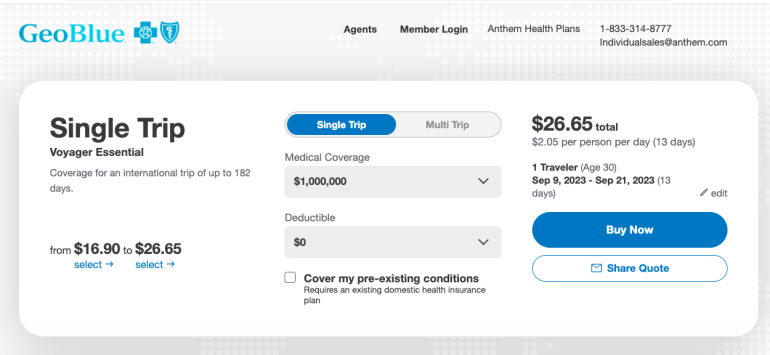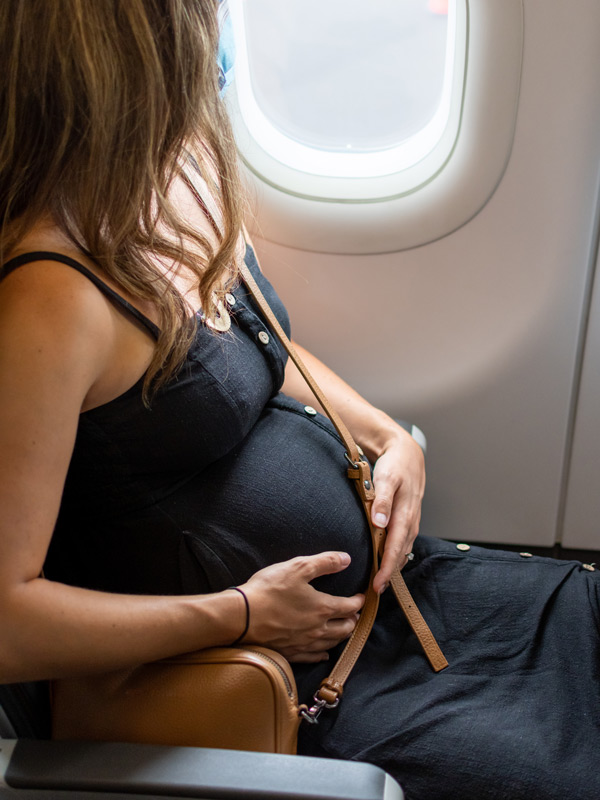June 1, 2020
Due to travel restrictions, plans are only available with travel dates on or after
Due to travel restrictions, plans are only available with effective start dates on or after
Ukraine; Belarus; Moldova; North Korea; Russia; Israel
This is a test environment. Please proceed to AllianzTravelInsurance.com and remove all bookmarks or references to this site.

Use this tool to calculate all purchases like ski-lift passes, show tickets, or even rental equipment.


Travel During Pregnancy: What Does Travel Insurance Cover?

Some of the most common questions we get at Allianz Global Assistance are about traveling while pregnant. While most pregnant women can safely travel without incident, sometimes complications arise and customers wonder, "What does travel insurance cover?"
Here’s the quick answer: Travel insurance can cover certain situations that result from unforeseen pregnancy complications, or a pregnancy that occurs after you’ve purchased your plan. Travel insurance typically does not cover trip cancellations or other travel losses resulting from normal pregnancy.
Like any other kind of insurance, travel insurance includes specific coverage definitions and restrictions. Read your agreement carefully, and if you have any questions about coverage, call. Pregnant women should consult their doctors with concerns and questions about safe travel.
If you’re pregnant, or you might be soon, it’s wise to protect upcoming trips. Maximize your coverage window by purchasing travel protection as soon as possible. Our most popular plan is OneTrip Prime , which includes substantial benefits for trip cancellation/interruption and medical emergencies.
Read on for a detailed guide to travel insurance and pregnancy from Allianz Global Assistance.
Pregnancy Complications: What Does Travel Insurance Cover?
You're in the first trimester of your pregnancy and feeling fine — until you begin feeling extremely nauseous a week before you're supposed to fly to New York on business. Your doctor diagnoses you with hyperemesis gravidarum, a severe and serious form of morning sickness, and you end up in the hospital on the day of your scheduled flight. Can travel insurance reimburse you for the canceled trip?
Yes. Travel insurance from Allianz Global Assistance can cover losses resulting from unforeseen pregnancy complications, such as pre-eclampsia, gestational diabetes or hyperemesis gravidarum. That means your travel insurance may reimburse you for nonrefundable trip costs lost if you must cancel or interrupt your trip because of pregnancy complications. The illness, injury, or medical condition you’re experiencing must be disabling enough to make a reasonable person cancel their trip, and a doctor must advise you to cancel it. For example, normal morning sickness would not be a covered reason for trip cancellation. When you’re filing a claim for trip cancellation/interruption related to a pregnancy complication, you’ll need documentation from your physician.
All travel insurance plans from Allianz Global Assistance include access to 24-Hour Emergency Assistance . If you experience a medical emergency while traveling, or any other problem, contact our hotline via phone or the TravelSmart TM app for rapid assistance. If your plan includes emergency medical benefits, your insurance may reimburse you for the cost of emergency medical care that you received for covered pregnancy complications while traveling.
Please note that travel insurance does not cover the chance that a complication might occur. For example, if you delivered prematurely with your first two pregnancies, your doctor might advise you to cancel the trip to Paris you planned for the sixth month of your third pregnancy. However, this is still considered a normal pregnancy because no complication has been diagnosed. Travel insurance would not cover the trip cancellation.
Surprise Pregnancy and Trip Cancellation
You and your spouse are planning a week-long European river cruise to celebrate your third anniversary. Tickets are hard to come by, so you book your trip a year in advance. You schedule the flights and purchase your travel insurance — and two months later, you discover you're pregnant. Will travel insurance cover your trip cancellation?
On some plans, Allianz Global Assistance lists pregnancy as a covered reason for trip cancellation if you find out you are pregnant after purchasing your policy. For your trip cancellation to be covered, you must provide medical records to verify the pregnancy occurred after that date. Please see your policy documents for your plan’s specific coverage. And if you’re planning a trip now, don’t wait to buy travel insurance! Get a quote today.

Late-Term Pregnancy and Trip Cancellation
You decide to plan a babymoon getaway so you and your sweetie can enjoy some time together before the baby arrives. You book your plane tickets and a bed-and-breakfast on the beach. You're feeling fine and getting excited. Then your doctor advises you, as a precaution, not to travel in the eighth month of pregnancy. Will travel insurance cover this pregnancy-related trip cancellation?
No. In this scenario, there are no medical complications with your pregnancy, so the cancellation will not be covered. Please understand that Allianz Global Assistance is not disagreeing with your doctor's recommendation not to travel — you should do what's best for you and your baby's health. However, most travel insurance plans from Allianz Global Assistance do not include normal pregnancy as a covered reason for trip cancellation (except as described above.)
Airline Rules for Flying While Pregnant
You're flying to Los Angeles to see your sister one last time before the baby's born. But when you get to the gate, the airline won't let you on board because you're too close to your due date. Will your travel insurance plan reimburse you for the missed flight?
No. Being refused service by a carrier because of normal pregnancy is not a covered reason for trip cancellation. Cruise ships and airlines have very specific rules about travel while pregnant. Here are selected airline pregnancy policies, but you should also call your travel supplier to check before you book your trip. Please note that this information is subject to change.
- American Airlines: A medical certificate is required to fly within four weeks of your delivery date in a normal, uncomplicated pregnancy. Travel is not permitted within seven days of your due date on domestic flights under five hours, or within four weeks of your due date on international flights, unless you get a medical certificate and clearance from a Special Assistance Coordinator. 1
- Delta: Delta does not impose restrictions on flying for pregnant women. However, ticket change fees and penalties cannot be waived for pregnancy. 2
- JetBlue: Pregnant passengers expecting to deliver within seven days are prohibited from travel, unless they provide a doctor's certificate dated no more than 72 hours prior to departure stating that the passenger is physically fit for air travel and that the estimated date of delivery is after the date of the last flight. 3
- Southwest: Southwest has no pregnancy prohibitions, but recommends against air travel beginning at the 38th week of pregnancy. 4
- United: To fly in or after your 36 th week of pregnancy, you must provide the original and two copies of an obstetrician’s certificate, dated within three days (72 hours) prior to your flight departure, that says you’re fit to fly. 5
Travel Insurance and Childbirth
You're enjoying your babymoon vacation in Cozumel when suddenly you feel the first twinge of labor. Twelve hours later, you're the proud mother of a baby girl. Will travel insurance cover the cost of labor and delivery?
No. Normal childbirth is not covered by travel insurance from Allianz Global Assistance. However, if complications arise in delivery, the costs of emergency medical care may be covered. Also, attending the childbirth of a family member can be a covered reason for trip cancellation, depending on your plan.
While travel insurance from Allianz Global Assistance can't cover every possible pregnancy scenario, we want to do our best to help! Our Assistance team is available 24 hours a day to provide expert advice and aid.
Related Articles
- Traveling While Pregnant: Key Considerations
- The Essential Packing Checklist for Flying With An Infant
- Great Babymoon Destinations in the US
- JetBlue.com
- Southwest.com

Get a Quote
{{travelBanText}} {{travelBanDateFormatted}}.
{{annualTravelBanText}} {{travelBanDateFormatted}}.
If your trip involves multiple destinations, please enter the destination where you’ll be spending the most time. It is not required to list all destinations on your policy.
Age of Traveler
Ages: {{quote.travelers_ages}}
If you were referred by a travel agent, enter the ACCAM number provided by your agent.
Travel Dates
{{quote.travel_dates ? quote.travel_dates : "Departure - Return" | formatDates}}
Plan Start Date
{{quote.start_date ? quote.start_date : "Date"}}
Share this Page
- {{errorMsgSendSocialEmail}}
Your browser does not support iframes.
Popular Travel Insurance Plans
- Annual Travel Insurance
- Cruise Insurance
- Domestic Travel Insurance
- International Travel Insurance
- Rental Car Insurance
View all of our travel insurance products
Terms, conditions, and exclusions apply. Please see your plan for full details. Benefits/Coverage may vary by state, and sublimits may apply.

Insurance benefits underwritten by BCS Insurance Company (OH, Administrative Office: 2 Mid America Plaza, Suite 200, Oakbrook Terrace, IL 60181), rated “A” (Excellent) by A.M. Best Co., under BCS Form No. 52.201 series or 52.401 series, or Jefferson Insurance Company (NY, Administrative Office: 9950 Mayland Drive, Richmond, VA 23233), rated “A+” (Superior) by A.M. Best Co., under Jefferson Form No. 101-C series or 101-P series, depending on your state of residence and plan chosen. A+ (Superior) and A (Excellent) are the 2nd and 3rd highest, respectively, of A.M. Best's 13 Financial Strength Ratings. Plans only available to U.S. residents and may not be available in all jurisdictions. Allianz Global Assistance and Allianz Travel Insurance are marks of AGA Service Company dba Allianz Global Assistance or its affiliates. Allianz Travel Insurance products are distributed by Allianz Global Assistance, the licensed producer and administrator of these plans and an affiliate of Jefferson Insurance Company. The insured shall not receive any special benefit or advantage due to the affiliation between AGA Service Company and Jefferson Insurance Company. Plans include insurance benefits and assistance services. Any Non-Insurance Assistance services purchased are provided through AGA Service Company. Except as expressly provided under your plan, you are responsible for charges you incur from third parties. Contact AGA Service Company at 800-284-8300 or 9950 Mayland Drive, Richmond, VA 23233 or [email protected] .
Return To Log In
Your session has expired. We are redirecting you to our sign-in page.
- Credit cards
- View all credit cards
- Banking guide
- Loans guide
- Insurance guide
- Personal finance
- View all personal finance
- Small business
- Small business guide
- View all taxes
You’re our first priority. Every time.
We believe everyone should be able to make financial decisions with confidence. And while our site doesn’t feature every company or financial product available on the market, we’re proud that the guidance we offer, the information we provide and the tools we create are objective, independent, straightforward — and free.
So how do we make money? Our partners compensate us. This may influence which products we review and write about (and where those products appear on the site), but it in no way affects our recommendations or advice, which are grounded in thousands of hours of research. Our partners cannot pay us to guarantee favorable reviews of their products or services. Here is a list of our partners .
Travel Insurance and Pregnancy: What to Know
Many or all of the products featured here are from our partners who compensate us. This influences which products we write about and where and how the product appears on a page. However, this does not influence our evaluations. Our opinions are our own. Here is a list of our partners and here's how we make money .
There’s a lot to think about when you’re pregnant — especially if you plan to travel. You’ll want to make sure your health care and your trip costs are covered if something goes wrong.
And while travel insurance for pregnancy may sound like a must-have, remember that not all plans will cover your specific needs. At the moment, there isn't a specific insurance option for those who are pregnant. Rather, pregnant people will need to consider travel insurance that includes coverage for trip cancellation and interruption, as well as emergency medical and evacuation costs.
Your decision to buy travel insurance while pregnant will depend on how much of your trip is nonrefundable, where you’re going and what coverages you already have. These coverages may include trip interruption insurance from your credit card issuer or emergency medical coverage from your current health insurer.
Here’s what you need to know to choose the best travel insurance for pregnancy.
Trip cancellation or interruption due to pregnancy
Most travel insurance policies will reimburse you for all or a portion of your nonrefundable travel costs if you have to cancel your trip for a covered reason. But for pregnant people, covered reasons are a little more complicated.
For most policies, normal pregnancy is not a valid reason to cancel your trip if you already knew you were pregnant when you purchased the insurance. But pregnancy may be a valid reason to cancel if you learn you're pregnant after you’ve booked your trip and paid for an insurance policy.
For example, if you prepay for a trip a year in advance, purchase Allianz travel insurance, and a few months later find out you’re pregnant and need to cancel your trip, the company will likely reimburse you for all or a portion of your lost travel costs. But you’ll have to prove that you learned about your pregnancy after you purchased the policy.
On the other hand, if you knew you were pregnant when you purchased the policy, you will likely not get reimbursed if you canceled your flight due to morning sickness, for example.
» Learn more: Can you fly while pregnant? It depends.
Trip cancellation or interruption due to complications of pregnancy
If you have complications during your pregnancy, travel insurance may cover your trip costs regardless of when you learned you were pregnant.
Keep in mind that only specific complications — like gestational diabetes, preeclampsia, hyperemesis gravidarum or miscarriage — are eligible, and a doctor must advise you not to travel due to your diagnosed condition.
» Learn more: What to know about Cancel For Any Reason (CFAR) travel insurance
Medical coverage for pregnant travelers
If you’re traveling domestically, your regular health insurance may be all the coverage you need. Check with your provider. If you’re going abroad, there’s a good chance your health insurance will not reimburse you for medical expenses while traveling. So for pregnant people traveling internationally, travel medical insurance is probably a good idea.
Secondary travel health insurance can be surprisingly affordable. Secondary plans kick in after you’ve used any applicable primary insurance coverage from your current health insurer.
Searching InsureMyTrip.com, we found secondary international medical insurance plans starting at $14 for a 30-year-old California resident traveling to France for 12 days in September. For this price, you receive coverage up to $50,000.
Want higher coverage limits? They’re available. For the same 30-year-old California-based traveler headed to France, GeoBlue 's Voyager Essential plan offers $1 million in travel medical coverage with a $0 deductible for $27 — again, that’s for the whole trip, not per day. This plan is not secondary coverage, meaning you can buy it even if you don’t have a primary health insurer.

» Learn more: Can I get travel insurance for pre-existing medical conditions?
Emergency medical evacuation due to pregnancy
If you’re traveling to large city, a health care facility is likely a short drive away. But if you’re traveling someplace remote, emergency transportation coverage , like a helicopter, can be a literal lifesaver. Covering this service with an insurance plan can save you a bundle.
Some credit cards give you automatic emergency medical evacuation when you use the card to book your trip, like the Chase Sapphire Reserve® . But if you didn’t use a credit card with emergency evacuation coverage or need higher limits, you may want to buy travel insurance. Most comprehensive plans include emergency medical evacuation insurance, but make sure it’s covered before you purchase your plan.
» Learn more: The best credit cards for travel insurance benefits
Where to buy insurance for traveling while pregnant
Different travel insurance companies have a variety of plans with varying coverage.
A policy from Travel Guard that was perfect for your nonpregnant friend when she traveled to Machu Picchu may not be as good as a policy from Travelex or Nationwide if you’re pregnant and cruising through Europe. Comparison shop and carefully note what’s covered and the deductible limits before you buy.
» Learn more: The best travel insurance companies
Travel insurance while pregnant recapped
You may not need travel insurance for pregnancy, especially if you’re traveling domestically and your trip is fully refundable — but don’t assume that’s always the case.
Read up on your existing coverage from your health plan and any insurance offered by your credit card . Then you can explore a little more of the world before baby arrives, knowing you’re covered for any scenario.
How to maximize your rewards
You want a travel credit card that prioritizes what’s important to you. Here are some of the best travel credit cards of 2024 :
Flexibility, point transfers and a large bonus: Chase Sapphire Preferred® Card
No annual fee: Bank of America® Travel Rewards credit card
Flat-rate travel rewards: Capital One Venture Rewards Credit Card
Bonus travel rewards and high-end perks: Chase Sapphire Reserve®
Luxury perks: The Platinum Card® from American Express
Business travelers: Ink Business Preferred® Credit Card

on Chase's website
1x-10x Earn 5x total points on flights and 10x total points on hotels and car rentals when you purchase travel through Chase Travel℠ immediately after the first $300 is spent on travel purchases annually. Earn 3x points on other travel and dining & 1 point per $1 spent on all other purchases.
75,000 Earn 75,000 bonus points after you spend $4,000 on purchases in the first 3 months from account opening. That's $1,125 toward travel when you redeem through Chase Travel℠.

1x-5x 5x on travel purchased through Chase Travel℠, 3x on dining, select streaming services and online groceries, 2x on all other travel purchases, 1x on all other purchases.
75,000 Earn 75,000 bonus points after you spend $4,000 on purchases in the first 3 months from account opening. That's over $900 when you redeem through Chase Travel℠.

1x-2x Earn 2X points on Southwest® purchases. Earn 2X points on local transit and commuting, including rideshare. Earn 2X points on internet, cable, and phone services, and select streaming. Earn 1X points on all other purchases.
85,000 Earn 85,000 bonus points after spending $3,000 on purchases in the first 3 months from account opening.

- Help and Support
- Travel Insurance
- Travel Insurance and Pregnancy
Pregnancy Travel Insurance
Everything you need to know about holiday insurance when pregnant.
If you and bump are planning a trip abroad, add pregnancy holiday insurance to the top of your checklist.
If you’re pregnant and planning a trip abroad, pregnancy travel insurance will no doubt be at the top of your checklist. But before you’ve even booked your holiday, many women will be concerned about whether they can fly, so let’s start there.
Can I fly while pregnant?
Flying while pregnant is a decision for mum and doctor; if your doctor or obstetrician gives you the green light to fly then you can.
According to the Royal College of Obstetricians and Gynaecologists , the safest time for pregnant women to fly is before 37 weeks if carrying one baby, or 32 weeks if carrying twins.
After this stage, there’s a chance you could go into labour, so it’s best to avoid going too far from home.
If you’re still hoping to travel, it's important to speak to your doctor or midwife and check it’s safe. They may advise against it if you have had any complications with your pregnancy.
If you’re over 28 weeks pregnant, the airline may ask to see a letter from your midwife or doctor. Some airlines have their own restrictions in place so it’s best to check their websites before you book.
Covid-19 - what our travel insurance covers
Our travel insurance now covers you for certain events related to Coronavirus (COVID-19), provided you have proof of a positive Covid-19 test and your cover is active at the time of the event.
What we cover
We provide cover for some costs related to Covid-19: please see Section 1 'emergency medical costs and repatriation' and Section 2 'cancelling or cutting short your trip' in your policy book for full details on what's covered.
We'll cover you if:
- you were diagnosed with Covid-19 before your trip was due to start
- a close relative died or became seriously ill as a result of Covid-19 before your trip was due to start
- you weren't allowed to board your pre-booked outbound travel due to symptoms of Covid-19
- an insured person or a close relative died during the trip because of Covid-19
- you couldn't take part in an excursion due to you self-isolating after getting Covid-19
What we don’t cover
You won't be covered if:
- you had reason to believe your trip may be cancelled, postponed or cut short when you booked it, purchased your policy or started your trip
- any government or public authority imposes travel restrictions or quarantine on a community, location, or vessel because of Covid-19 (this includes, but is not limited to, local lockdowns, entry requirements, being denied entry and airspace closures)
- you have to quarantine after arriving in the UK or abroad
- the Foreign Commonwealth & Development Office (FCDO) change their advice to avoid ‘all travel’ or ‘all but essential travel’ to your destination because of Covid-19
For more information about how Coronavirus (COVID-19) affects your travel cover, see our FAQ page . And remember to check the policy booklet carefully before you buy to make sure our cover meets your needs.
What does Pregnancy Travel Insurance cover?
Admiral Pregnancy Travel Insurance covers emergency medical treatment costs and repatriation as standard, up to £20million depending on the level of cover chosen.
We’ll only cover complications of pregnancy and childbirth abroad (as described in the ‘Definitions’ section of our policy wording). This includes treatment needed due to complications resulting from a pregnancy such as an emergency caesarean up until 40 weeks.
There’s no cover for routine medical care such as check-ups, pre-natal care, the costs of natural labour and childbirth after 32 weeks (or 24 weeks in the case of twins or multiples) or post-natal care. There’s also no cover if the carrier denies you boarding.
Three levels of Pregnancy Travel Insurance
Read the full list of benefits in the policy summary booklet .
Not all insurers will cover pregnancy after a certain stage when it’s more likely you could have a normal birth, which isn’t considered a medical emergency.
What stage this is, and the medical care that’s covered, varies from insurer to insurer so check this thoroughly before taking out your travel insurance.
Is pregnancy a medical condition for travel insurance?
Whether you need to declare your pregnancy depends on your insurer’s guidelines. For Admiral Travel Insurance, pregnancy isn’t considered a pre-existing condition , so there's no need to tell us before you travel.
However, make sure you tell us about any medical conditions you have because of your pregnancy, such as:
- Gestational diabetes
- High blood pressure
If you don't tell us, you might not be covered should you need medical assistance.
What happens if I go into labour abroad?
At the early signs of labour, you should try to stay calm and go to the nearest hospital as soon as possible. If it’s a medical emergency, please call us immediately so we can help - +44 (0)292 010 7777.
If you’re planning to have your baby abroad, you’ll need to speak to your doctor in the UK first. You’ll also need to apply for a Maternity S2 to cover the costs of your care because most policies don’t cover planned overseas births.
Be aware lots of airlines won’t allow new-borns on flights until they’re two-weeks-old, or even longer for premature babies. Have a plan in place if you need to stay away longer than expected and ask the airline when you’ll be able to fly home.
What if I have a pre-existing condition?
A pre-existing condition is a short or long term illness or injury you have or have had before you buy travel insurance. This includes having symptoms, tests, diagnosis or medical treatment for a condition.
You can declare your pre-existing conditions during the quote process to see if we can offer cover. If you’re unsure what needs to be declared or if you're unable to find your condition on the medical conditions list, please contact us on 0333 234 9913 .
Your pre-existing conditions won’t be covered unless you’ve:
- Declared them all on your policy
- Received written confirmation that we’ll cover your medical condition
- Paid any additional premium in full
Policy terms and conditions apply. Please note, if you’ve had a positive diagnosis of Covid-19 and been prescribed medication, received treatment, or had a consultation with a doctor or hospital specialist for any medical condition in the past two years, this needs to be declared on your policy.
If you don’t tell us about your pre-existing conditions or give us incorrect information, your policy may be invalid, and we may refuse all or part of any claim you submit.
For a quote with us, click the green button above.
The MoneyHelper directory
If you require cover for more serious medical conditions, MoneyHelper may be able to help you find specialist travel insurance through their medical directory.
If you wish to get in touch with them you can call them on 0800 138 7777 or find them online . (Monday to Friday 8:00-18:00, closed on Saturday, Sunday and bank holidays.)
Things to check before travelling while pregnant

Your questions answered
Do you need special travel insurance when pregnant.
Admiral single trip and annual travel insurances cover pregnancy and you won’t pay more for your cover as it’s not considered a pre-existing medical condition. You’ll get the standard cover for things like:
- Lost luggage
- Travel disruption
- Lost or stolen belongings
But we’ll also cover the costs of any emergency medical treatment you receive as the result of complications during your pregnancy.
Do I have to declare I’m pregnant on travel insurance?
Pregnancy is not considered a pre-existing medical condition so you don’t need to let us know before you fly. You should let us know about any conditions relating to your pregnancy to make sure you’re properly covered.
Can I fly after 32 weeks?
This is up to you and your doctor to decide – if it’s safe for you to do so and your doctor says it’s OK then you can fly. In terms of insurance, with Admiral you’re covered up to 40 weeks, but we strongly advise you get medical permission to fly in later stages of pregnancy. There's no cover for the costs of natural labour and childbirth after 32 weeks, or 24 weeks in the case of twins or multiples
I’ve just found out I’m pregnant and I don’t wish to travel. Am I covered?
No, you'll only be able to claim for cancellation due to pregnancy if your doctor advises against travel due to specific medical complications.
Take a look at our Travel Insurance and Pregnancy page for more information.
Does being pregnant affect my insurance?
Pregnancy isn’t considered a pre-existing medical condition , so there’s no need to tell us before you travel.
However, make sure you tell us about any medical conditions you have because of your pregnancy, such as gestational diabetes or high blood pressure. If you don’t, you might not be covered should you need medical assistance.
We will only cover complications of pregnancy and childbirth abroad (as described in the ‘Definitions’ section of our policy wording) so you aren't covered for routine medical care such as check-ups, pre-natal care, normal childbirth and post-natal care. There is also no cover if the carrier denies you boarding.
Getting the most out of your trip
Going anywhere nice.
Off to one of the destinations below? Take a look at our guides for some hints and tips on what you need to remember.
Travel insurance that suits you
Whether you're travelling solo, with your family, or with a little one on the way, read our guides to make sure our cover is right for you.
Family Travel Insurance
Student travel insurance, travelling while pregnant, travel insurance over 65, travelling with medical conditions, travel insurance upgrades.
Whether you want the adrenaline rush of a skiing holiday, or fancy taking to the seas on a cruise, you'll need to add extra cover to your policy.
Cruise Travel Insurance
Ski travel insurance, gadget travel insurance, adventurous sports insurance, single trip insurance, annual trip insurance.
Travel Insurance and Pregnancy: What to Know
Travel insurance policies generally exclude normal pregnancy-related expenses but can cover you for unforeseen medical issues..
)
Christy Rakoczy has been a personal finance and insurance writer for over a decade. Her work has been published on USA Today, MSN, Yahoo Finance, Credit Karma, Forbes Advisor, and more. Christy has a JD from UCLA School of Law and previously worked as a data analyst for Blue Cross and as a paralegal studies instructor before transitioning to writing full time.
Read Editorial Guidelines
)
15+ years in content creation
7+ years in business and financial services content
Chris is a seasoned writer/editor with past experience across myriad industries, including insurance, SAS, finance, Medicare, logistics, marketing/advertising, and many more.
Featured in
Updated September 19, 2023
)
Table of contents
- Travel insurance
- What’s covered
- What’s excluded
- Getting insurance
- Airline restrictions
Regular prenatal care is crucial to a healthy pregnancy. Unfortunately, if you’re traveling while pregnant, your regular health insurer may not cover you if you’re out of state or out of the country. That’s because many insurers provide coverage only within their local networks, which often include health providers only near where you live. [1]
Travel insurance can provide some coverage if you’re traveling while pregnant, but the protections available may be more limited than you think.
Here are some types of travel insurance you can consider if you’re going away while expecting.
What is travel insurance for pregnancy?
Travel insurance protects against losses you experience when things don’t go as planned. This includes events that happen before or during a scheduled vacation. Some types of travel insurance you could purchase include:
Trip cancellation insurance: Trip cancellation insurance will reimburse you for non-refundable expenses if you can’t take your vacation for a covered reason.
Trip interruption insurance: Trip interruption insurance provides reimbursement for the unused portion of your vacation if you must cut the trip short for a covered reason.
Travel medical insurance or medical benefits coverage: Travel medical insurance provides short-term medical coverage, so your healthcare bills will be paid if you unexpectedly require medical care while on a trip.
Emergency medical evacuation insurance: This insurance pays for the costs if you must be evacuated from your location to an adequate medical facility.
Each of these types of coverage could be useful if you’re traveling while pregnant, as your condition could leave you unable to depart on a trip or continue the trip. However, it’s important to understand the limitations of the travel policy you’re buying before purchasing coverage.
While many travel insurance companies reimburse for medical expenses related to emergency complications associated with pregnancy, normal pregnancies wouldn’t usually be viewed as a reason to cancel or interrupt your trip, nor would routine prenatal care generally be paid for by travel medical insurance.
What does travel insurance cover when you’re pregnant?
Travel insurance doesn’t cover every potential medical need or every potential reason for cancellation or interruption of a trip. Compensated losses must occur for a covered reason. However, travel insurance does provide coverage for certain pregnancy-related issues.
While the specifics vary by policy, you can expect most travel insurance policies to cover the following:
Trip cancellation, interruption, or medical needs due to unexpected illnesses or accidents not related to your pregnancy
Emergency medical care due to complications of pregnancy, including hospitalization, ambulances, or medical evacuation if necessary
Trip cancellation or interruption due to complications of pregnancy [2]
Unforeseen complications of pregnancy that are often covered by travel insurers include:
Ectopic pregnancy
Miscarriage
Pre-eclampsia
Hyperemesis gravidarum
Other complications of similar severity that are considered a medical emergency
Some insurers provide coverage for pregnancy-related complications only during specific times during your pregnancy. [3] And many insurers don’t specifically list the complications that would be covered but instead make the decision on a case-by-case basis.
What does travel insurance exclude for pregnant travelers?
Travel insurance plans aren’t meant to pay for routine medical care associated with normal pregnancy. Most policies won’t cover:
Medical costs associated with normal labor or childbirth
Routine pregnancy symptoms, such as morning sickness
Trip cancellation due to an airline carrier rejecting you because you’re traveling outside of its normal guidelines
False labor
Required bedrest
Pre-existing medical conditions that are exacerbated by pregnancy
Routine prenatal care
Travel insurance policies generally won’t reimburse you for a canceled or interrupted trip if your doctor simply advises you not to travel due to your pregnancy, unless there’s a specific unexpected medical condition or complication.
You also won’t be covered if you travel against the advice of your doctor or if you were medically unable to travel at the time you booked the trip.
How to buy travel insurance when you’re pregnant
You should purchase travel coverage as soon as you book your trip when pregnant due to the increased risk of a covered complication. If you don’t buy coverage right away, make sure to purchase it at least 15 days prior to your trip to avoid added costs.
Remember, travel insurance excludes pre-existing conditions, so it’s a good idea to purchase a policy immediately because any complications that arise before you purchase a policy wouldn’t be covered. [4]
You should shop around for a policy carefully and read the fine print to understand what types of medical treatment and pregnancy-related complications would be covered. If you want to be able to cancel your trip due to routine issues associated with pregnancy or due to a potential future pregnancy, you should consider purchasing “cancel for any reason” (CFAR) coverage.
How much travel insurance costs for pregnant travelers
Travel insurance typically costs 4% to 10% of your total prepaid non-refundable trip cost. If insurers view your pregnancy as adding risk, you can expect to pay more for coverage. Pregnant travelers may also pay more for travel insurance when buying add-ons, such as CFAR coverage.
What to know about airline restrictions when pregnant
If you’ll be flying while pregnant, it’s important to know that some airlines restrict travel for people who are expecting. If you can’t fly due to airline policy, travel insurance generally won’t cover the costs of your canceled trip.
Here are some airlines’ rules for when pregnant people are allowed to travel.
Travel insurance pregnancy FAQs
If you’re planning to travel during a pregnancy, this additional information may help as you research your travel insurance options.
What pregnancy issues does travel insurance not cover?
Travel insurance doesn’t cover routine pregnancy-related symptoms. You also won’t be reimbursed through trip cancellation coverage if you decide to cancel your trip because you become pregnant, if your doctor says you can’t fly, or if you’re refused access to a flight or accommodations because of their policies on pregnancy-related travel.
Will travel insurance pay for cancellation if a doctor orders bed rest?
Travel insurance typically won’t pay for a cancellation simply because a doctor orders bed rest. You may be able to get reimbursed through trip cancellation coverage if you must go on bed rest due to a specific unexpected complication of pregnancy covered by your insurer. If you have “cancel for any reason” coverage, this will also provide partial reimbursement if you must cancel your trip because you’re put on bed rest.
Will travel insurance pay for false labor?
Travel insurance generally doesn’t pay for false labor. A travel insurance policy generally won’t cover any normal symptoms of pregnancy. You would receive coverage for medical care only if you had medical coverage and experienced an emergency related to your pregnancy, such as developing pre-eclampsia or experiencing another severe unexpected complication.
Do you need to disclose your pregnancy to your travel insurance company?
You generally don’t need to disclose your pregnancy to your travel insurance company, although the rules can vary by insurer. You won’t receive coverage for any routine pregnancy symptoms, for normal prenatal care, or for normal childbirth.
Is travel insurance worth it for pregnant people?
Purchasing travel insurance can be an important step in making sure you’re prepared for unexpected events if you’re traveling while pregnant, according to the Centers for Disease Control and Prevention. [5] Pregnant women are also advised to ensure travel insurance covers pregnancy-related expenses by the U.S. State Department. [6]
However, it’s important to understand the limitations of coverage, as most travel insurance policies don’t cover routine pregnancy-related expenses and will pay only for complications.
Related articles
- Tesla Battery Replacement Cost
- What to Know About Illinois Emissions Testing
- What Is the Difference Between a Real ID and a Driver’s License?
- How Much Will Insurance Pay for My Totaled Car? (Full Guide)
- Can You Legally Drive with an Expired License?
- How Many Cars Can You Have in Your Name?
- Study: Average Miles Driven Per Year in the U.S. (2024)
Popular articles
- Cheapest Auto Insurance in Lubbock, Texas
- Best Cheap Full-Coverage Car Insurance
- 7 Best Car Insurance Companies
- Can an Insurance Company Force You to Total Your Car?
- How to Participate in the teenSMART Driver Program
- The Best Car Insurance for Bad Drivers
- Guide to Windshield Replacement in Massachusetts
- Healthcare.gov . " Multi-state plan ."
- World Nomads . " Travel Insurance for Pregnancy ."
- Insuremytrip.com . " Travel Insurance & Pregnancy ."
- Travelinsurance.com . " What to Know About Pregnancy and Travel Insurance Coverage ."
- CDC . " Traveler's Heath ."
- U.S. State Department . " Women travelers ."
)
Latest Articles
)
Cheapest Car Insurance for Drivers Under 25 (2024)
Finding cheap car insurance for drivers under 25 can be tough, but there are plenty of affordable options if you know where to look.
)
Best Car Insurance Companies for Teenagers (2024)
Teens are notoriously expensive to insure. Check out the cheapest car insurance companies for teenagers to find a better deal.
)
Best Car Insurance with a $500 Deductible (2024)
Nationwide has the cheapest full-coverage car insurance with a $500 deductible, at $273 per month. Your deductible is what you pay when you file a claim.
)
Cheapest Car Insurance Companies for High-Risk Drivers (2024)
High-risk drivers face challenges with car insurance rates, but options are available. Research the best coverage for high-risk drivers.
)
The Best Car Insurance for Bad Drivers (2024)
Drivers with bad driving records get the best car insurance rates from companies like GEICO, State Farm, and Travelers.
)
6 Best Pay-as-You-Go Car Insurance Companies (2024)
Pay-as-you-go car insurance has a different payment model than traditional insurance. See which companies have the best pay-as-you-go coverage.
Pregnancy travel insurance - here's what to know before you book

--> BY Jessica Humphries
Last updated . 20 December 2023
Relish the excitement of your travel plans with your blossoming baby bump by securing the right cover.
Enjoying a journey with a little one on the way? The thrill of travel is irresistible, but let’s face it – the logistics can pile up faster than you can say ‘jetlag’, and Mama – you’ve got enough on your plate. If your adventurous side still calls, despite having a baby on board, navigating the realm of travel insurance becomes a whole new adventure. Fear not, we’ve got everything you need to know about travel insurance when you’re pregnant right here.
Key things to consider before buying coverage
When you’re planning your trip with a baby on board, there are some things you’ll need to consider straight-up.
How far along are you?
We know you’ve heard the question a million times, but here’s where it really counts. When it comes to pregnancy and travel insurance, most insurers graciously cover single, uncomplicated pregnancies following natural conception. However, there’s a catch – the coverage window varies.

The best time to travel is within your second trimester.
Some providers extend their umbrella up to 30 weeks, while others gently fold it at 23 to 26 weeks pregnant. Most importantly, remember – the stork won’t deliver coverage for birth-related costs or newborn expenses. So, if you can, keep your window wide and travel within the sweet spot (more on that later).
Is pregnancy considered a ‘pre-existing medical condition’?
Thankfully, pregnancy isn’t generally considered a pre-existing medical condition when you’re obtaining travel insurance. If you’re under 26 weeks (at the time of travel) with just one bub on board, you may not need to declare it at all. However, honesty is key, especially if you’re dealing with a more complex pregnancy. Disclose the details to your insurer to make sure you’re covered.

Be prepared with pregnancy travel insurance for your safety.
What to look for in a pregnancy travel insurance policy
It’s time to dig into the details. Here’s what you’ll need to keep an eye out for in your travel insurance to make sure you and your bump have a smooth ride.

Travelling while pregnant can be a fulfilling experience. (Image: Josh Bean)
The benefits buffet
Navigating pregnancy with travel insurance is like entering an extensive buffet – enticing, filled with numerous options, and just a tad overwhelming. Yet, the crucial factor lies in the details. Delve into the fine print to ensure you grasp the details of the nitty gritty.

Tick off the benefits of your pregnancy coverage.
If you identify any gaps, ask your insurer about tailored policy add-ons for a personalised experience. Alternatively, explore other options that cater specifically to your unique pregnancy needs.
- Make sure your policy covers (on top of standard travel insurance staples):
- Unforeseen pregnancy challenges.
- Emergency medical coverage abroad: including expenses for unexpected illnesses, complications, or severe injuries related to your pregnancy.
- Trip cancellation protection.
- Around-the-clock travel assistance.

Make sure that your policy covers unexpected pregnancy challenges.
Cancellation considerations
If there’s ever a time when last-minute travel plans can swiftly change, it’s during pregnancy. Your pregnancy might even be a time when you consider locking in your coverage before finalising your booking. Locking in coverage ensures that in the event of unexpected pregnancy complications leading to a trip cancellation, you’re covered – no strings attached.

Consider last-minute travel changes especially when you’re travelling with a child.
Find out what’s excluded
Navigate the exclusion territory carefully. Be aware that certain conditions, like conception through IVF, expecting multiples, or planning travel after the approved gestational weeks, may lead to limited or no coverage.
Common exclusions:
- Conception through assisted reproduction (IVF).
- Seeking reimbursement for childbirth or newborn healthcare expenses if you give birth on your trip.
- Travelling against medical advice from your doctor.
- Expecting twins (or more!).
- Planning travel beyond the approved weeks according to your provider.
- Dealing with pregnancy complications (previous miscarriages or premature labour, gestational diabetes etc.) – disclose them to avoid issues.
- Routine pregnancy check-ups abroad.
Remember, some exclusions can be lifted with premium payments or a medical assessment.
Trimester travel tactics: A travel roadmap for every stage
When planning your travels, take your pregnancy stage into account for a seamlessly enjoyable journey tailored to each trimester.
First-trimester trail
The first 12 weeks are the opening act of your pregnancy journey. While generally safe for travel, be aware that morning sickness might steal the show. Consider scheduling your adventures post-week 12 to dodge any queasy interludes.

You may experience morning sickness during your first trimester.
Second-trimester bliss
The perfect time for a babymoon, your second trimester offers you a golden ticket to travel bliss, sans complications. Chat to your doctor, pack your bags, and make the most of this worry-free window.

Always check with your doctor for any pregnancy reminders before travelling. (Image: Lucas Favre)
Third-trimester reality check
Some airlines may give side-eye glances if you’re deep into the third trimester, and many travel insurance providers will cap their coverage around the 26-week mark. If leisure is the plan, think twice before boarding that flight.

It’s best to travel with a companion.
As you embark on this exciting journey with a baby on board, remember that a well-informed approach to travel insurance during pregnancy is your ticket to peace of mind. From navigating coverage windows to crafting your personalised pregnancy passport and considering trimester-specific tactics, your wanderlust need not be put on hold. Embrace the adventure, plan wisely, and savour every moment of this unique chapter in your globetrotting story. Safe travels, mama!

Travelling during pregnancy can be your first milestone as a family.
For more tips and advice, read our travel insurance hub to help you navigate the ins and outs of what to do before you head overseas.
Leave your comment, cancel reply.
Save my name, email, and website in this browser for the next time I comment.
You might also like

Ski holiday insurance – the facts you need to know
Heading to the hills? Stay fancy-free in a winter wonderland by decoding the ins and outs of ski travel insurance first. As majestic snowflakes blank...

Everything you need to know about cruise insurance
Before setting sail, getting the lowdown on cruise insurance is a must. Standard travel insurance might not cut it, so making sure you have the right ...

10 ways to save money on your travel insurance
Dreaming of your next getaway? While travel insurance is a must, there’s no need to break the bank. Ready to make your travel dreams a reality but ...

How to get travel insurance when you have a medical condition
Don’t let pre-existing conditions be a roadblock to your wanderlust. Learn the ropes of securing the right travel insurance for a hassle-free advent...

Here’s what you’ll really want from your insurer when travel goes wrong
Turn hiccups into manageable adventures by finding the coverage you’ll wish for when plans hit a bump. Embarking on a travel adventure is a journey...

Here’s why travel will return bigger and better than before
Don’t cry because the ‘best years’ are behind you; smile because we now have the tools to travel bigger and better than ever before, writes Dilv...

Travel Advice: Important information about cover for Coronavirus. Read more . View the latest travel warnings here .
Here’s how travel insurance works when you’re pregnant

Pregnant and want to travel? If your doc gives you the a-ok, here how your travel insurance covers you, in case of a medical emergency or bump-related travel cancellation.
Planning a babymoon? Or a third trimester trip? Will your travel insurance cover you? Use our guide to answer all your pregnancy-related travel insurance concerns. We’ll look at:
- When it’s safe to travel pregnant
- Airline rules for pregnancy
- Standard travel insurance cover
- Optional extra cover for pregnancy
- What you’re not covered for
- Health risks while travelling pregnant
How many weeks?
Bringing a little explorer into the world? We’re excited for you! And if you’re sneaking in a little exploring of your own before D day, we’re even happier for you! That’s because we believe in the magic travel, and expecting mothers should be no exception.
If you’re thinking of taking a holiday overseas while pregnant, you’re not alone. According to research by finder.com.au , one in five mums take a holiday in their third trimester. The study found that younger mothers are more likely to make the trip, with almost a quarter of mums under 30 enjoying a getaway while pregnant, compared to 16% of those aged over 40. Unsurprisingly, most mums are looking to stay closer to home that late in their pregnancy, and are about three times as likely to travel domestically rather than overseas. But that doesn’t stop 5% of expecting mums from jetting off overseas, even while heavily pregnant.
The World Health Organization (WHO) however, advises against air travel for pregnant women after the 36th week of pregnancy or four weeks before the expected date of childbirth. Since labour can begin at any time during the last few weeks, it is recommended to avoid traveling during this period. Instead, WHO recommends that the safest time for expecting mums to travel is in the second trimester.
Airlines and pregnancy
It’s also important for you to know any airline restrictions placed on pregnant travellers before you book your trip. Airline restrictions around flying while pregnant vary. Another factor is length of the flight itself.
Both Qantas and Virgin Australia for example, allow women without pregnancy complications to travel on flights more than four hours in length up to the end of the 36th week for single pregnancies, and the end of the 32nd week for twins or more.
For flights less than four hours, you can usually travel up to the end of the 40th week in a single pregnancy and the 36th week for a multiple pregnancy.
But both airlines require women travelling after 28 weeks of pregnancy to carry a note from their doctor or midwife confirming their due date and pregnancy details. For Virgin Australia travellers, this letter needs to be dated no more than 10 days before travel.
And if you have complications, you have to travel with a medical clearance form signed by your doctor.
Check out the pregnancy policies of popular airlines departing Australia:
Air Asia , Emirates , Jetstar , Virgin Australia , Qantas , Singapore Airlines.
What to expect from Australian travel insurers
Typically, travel insurance offers cover for emergency medical treatment while travelling, and this extends to medical emergencies pregnant women might experience. So if you’re pregnant, and you fall sick, or break a leg, and these events are in no way related to your pregnancy, you’ll be able to claim the hospital trip.
It’s really important to know that cover is provided to you, but not provided for childbirth or the health of a newborn child. When a medical emergency is pregnancy related – let’s say you need help with debilitating nausea – your ability to claim is going to largely depend on 3 questions – your due date , our doctor’s approval , and whether or not your emergency relates to fertility treatment, triplets and known complications.
Travel with Jane looks after expecting mums with two levels of cover. First we’ll look at the benefits offered under our standard cover, and then we’ll explore an optional extra for pregnancy – our Pregnancy Add-on.
What we cover as standard
Travel with Jane offers emergency medical cover for expecting mums up to 26 weeks in the case of a single baby, and 19 weeks in the case twins. That’s 2 weeks more than a lot of the competition.
What you are not covered for
Pregnancy-related costs will not be covered in any of the following circumstances if you have not purchased a Pregnancy Add-on . (More on that next)
- if you have experienced any pregnancy complications prior to purchasing your policy
- multiple pregnancies arising from services or treatment associated with an assisted reproductive program, including but not limited to in vitro fertilisation;
- a single pregnancy after 26 weeks
- a pregnancy with twins after 19 weeks
- for childbirth at any time
- neonatal care
What we cover in our optional extra Pregnancy Add-on
Get extra cover for more weeks with our Pregnancy Add-on . We’re really proud of this! An optional extra made specifically for pregnant women.
- Single pregnancy up to and including 32 weeks gestation
- Multiple pregnancy up to and including 23 weeks gestation
If you’re up to 32 weeks pregnant with a single child, or up to 23 weeks with twins when an incident occurs, and you have written certification from a medical practitioner that you are fit to travel up to ten days prior to your departure, your emergency medical costs are covered under our Pregnancy Add-on. The maximum payout under this benefit is is $1 million.
Just to be clear, even with our Pregnancy Add-on, emergency childbirth coverage includes the costs related to your birth and post-birth medical care. It won’t cover your newborn’s medical costs. The costs that come with looking after a newborn after an emergency birth can vary greatly. If we covered this risk, it pushes up premiums across the board.

Conditions you’re covered for
If you purchase the Pregnancy Add-on, any medical expenses related to specific pregnancy-related complications otherwise excluded by this policy (see: What we don’t cover at all p. 59 of the PDS ) are covered subject to policy limits and exclusion. This includes:
- toxaemia (toxins in the blood);
- gestational diabetes (diabetes arising as a result of pregnancy)
- gestational hypertension (high blood pressure arising as a result of pregnancy)
- pre-eclampsia (where you develop high blood pressure, carry abnormal fluid and have protein in your urine during the second half of pregnancy)
- ectopic pregnancy (a pregnancy that develops outside of the uterus)
- molar pregnancy or hydatidiform mole (a pregnancy in which a tumour develops from the placental tissue
- post-partum haemorrhage (excessive bleeding following childbirth);
- retained placenta membrane (part or all of the placenta is left behind in the uterus after delivery)
- placental abruption (part or all of the placenta separates from the wall of the uterus)
- hyperemesis gravidarum (excessive vomiting as a result of pregnancy);
- placenta praevia (when the placenta is in the lower part of the uterus and covers part or all of the cervix)
- miscarriage
- emergency caesarean section
- a termination needed for medical reasons
- premature birth more than 8 weeks (or 16 weeks if you know you are having more than one baby) before the expected delivery date.
Your pregnancy-related medical costs will not be covered by Travel with Jane’s Pregnancy Add-on in this situations:
- a single pregnancy after 32 weeks
- a pregnancy with twins after 23 weeks
Main health risks of flying
Deep vein thrombosis, or DVT, is the main health concern for pregnant women on planes.
This is when a blood clot forms in a deep vein of the leg, which can cause complications such as pain, inflammation and swelling. The greater danger with these clots is that they can dislodge and travel through the circulatory system, blocking blood supply to the lungs.
The risk of DVT is higher when pregnant and being immobile for long periods is also a risk factor, so it’s worth keeping in mind for any sort of travel, including long car trips.
To reduce your risk keep well hydrated, make sure you’re well mobilised during the flight and wear compression stockings.
Childbirth overseas
If you are travelling in your third trimester OR you unexpectedly go into labour overseas there are a few things to consider. Citizenship rules change from country to country, so it’s a good idea to understand the local laws before travelling.
If you are an Australian citizen and you give birth overseas, you’ll need to apply for your child’s Australian citizenship and passport before you can return home. For application forms and more information visit the Department of Immigration and Border Protection website.
Vaccinations for pregnant women
As a pregnant woman, you are at risk of serious complications if you contract malaria or viral hepatitis E. Certain standard vaccinations can also be harmful to your baby when you’re pregnant.
We recommend you get in touch with your doc before you travel to ensure you have the right vaccinations for your trip. Nothing is more important than protecting the health of you and your baby.
Check here to see the list of vaccines recommended by the Australian Department of Health
Whether it’s a week in the tropics or a local trip reached by car, planning a babymoon is one of the latest trends in pregnancy. But what is a babymoon exactly? It’s a chance for expecting parents to get away, unwind and emotionally prepare for the exciting changes that lie ahead.
Choose the Best Seat If you’re travelling by airplane, try to get a spot on the aisle so you can get up and stretch your legs. The same goes for a car ride -factor in time to stop along the way so you can get out and take a short stroll and toilet break. Take care of your feet and legs, where swelling can really take hold.
Take It Slow A babymoon probably isn’t the time for mountain biking or other strenuous physical activity. Be smart by pacing yourself and building in lots of downtime to nap and read.
Suitable accommodation You’ll want to make sure that wherever you pick, you have access to:
- A large comfy bed with extra pillows
- Healthy menu options
- Quality, hygienic food service setup
- Day spa with staff trained in ante-natal massage and therapies
- A nearby hospital or doctors
A local OB/GYN Try not to worry in advance, but be prepared for any kind of pregnancy complication by obtaining the name and number of a local OB/GYN. You’ll have peace of mind just knowing you can call someone if you have a concern.
Pregnancy travel checklist
It’s good to be well prepared for an upcoming journey. It’s even more important when you’re pregnant, with more to consider for you and your unborn baby. Check these steps before you jet off.
- Check the airline restrictions for flying while pregnant
- Register with Smartraveller – let the Australian Government know where you’re going, so they can contact you in an emergency.
- Visit your GP or OB/GYN– discuss your travel plans and get the relevant vaccinations. You will most likely need a medical certificate confirming you’re fit to travel.
- Research your destination – consider the foods, cultures and climates of the places your visiting. Know what to avoid, particularly while pregnant.
- Pack correctly – pack clothes that take your changing shape into account and keep you comfortable.
Understand your cover
Conditions and exclusions apply to every cover level and optional pack. View our Combined Product Disclosure Statement and Financial Services Guide for full details. Sub-limits apply. Not sure? Our friendly team are here to help. Get in touch
We support women who challenge the gender pay gap
Since Day 1 Travel with Jane has been about levelling the playing field for women in Australia. In 2020, we’re taking the fight global. Stay tuned to learn how you can support the women who tackle the gender divide here and abroad.
Love cool stuff? Subscribe to our newsletter
Join our mailing list for exclusive invites to travel insurance sales, competitions and giveaways. Plus travel inspiration and tips for women who love to travel & make the world a more equal place.

- " id="mainPhoneNumber">
- Single Travel Insurance
- Annual Travel Insurance
- Cruise Travel Insurance
- Family Travel Insurance
- Seniors Travel Insurance
- Ski Travel Insurance
- NZ Travel Insurance
- Zoom Travel Insurance
- See more companies...
- Travel Insurance Guide
- Covid-19 Help
- Read Reviews
- Write a Review

Please Note - If you are cruising around Australia you need to select Pacific. With Regions, variances can apply for Bali, Indonesia, Japan and Middle East. You are not required to enter stop-over countries if your stop-over is less than 48 hours.
If you don’t know where you’re traveling to within the next 12 months, choose Worldwide to ensure you’re covered no matter where you go. If you’re travelling to multiple countries choose the region that you are visiting that is furthest away (excluding stopovers less than 48 hours). In most cases you will be covered for the closer regions as well. For example, if you choose Europe, you will also be covered in the Middle East, Asia and Pacific.
Worldwide means anywhere in the world
Americas means USA, Canada, South America, Latin America, Hawaii and the Caribbean
Europe means all European countries, including UK
Middle East refers to the area from Syria to Yemen; Egypt to Iran
Asia generally means Asia and the Indian subcontinent. For some insurers this excludes Japan*
Pacific means the South West Pacific, Australia and Indonesia/Bali*. Select Pacific for domestic cruises in New Zealand waters
New Zealand means domestic travel within New Zealand only
*Note: Variances apply for Bali, Indonesia, Japan and Middle East. Check that your destination is covered once directed to your chosen insurer’s site.
pregnancy Travel Insurance Guide
Most of us know the importance of purchasing travel insurance and the peace of mind it brings. So when it comes to travelling during pregnancy , whether you’re jetsetting to an island resort to put your feet up or heading to a comforting family home abroad, it’s important to get travel insurance that covers you and your unborn baby. The good news is, several Kiwi companies will cover you for travelling when pregnant, and we've done the research to tell you who!
Typical Pregnancy Cover In New Zealand
So who covers what.
Click the 'plus sign' for more detail on the terms of cover for each insurer.

General Advice Warning: The contents of this article were accurate at the time of writing. Insurers change their policies from time to time, so some information may have changed. You should always read the Product Disclosure Statement of your chosen insurer to understand what is covered and what isn't. The information provided is of a general nature only and does not take into account any personal objectives, financial situation or needs. Before making a decision you should consider the appropriateness of the information having regard to your personal circumstances.
Pregnancy Exclusions
It’s important to remember that exclusions apply to most policies. For example even if you’ve found an insurer that covers your specific circumstances, you probably wouldn't have cover:
- if you travelled against doctors advice
- for complications that exist with the pregnancy
- if your trip extends beyond the maximum weeks of pregnancy permitted (expectant mothers can still buy a standard policy after the maximum gestation limit; however they won't be covered for anything related to the pregnancy)
- if the pregnancy resulted from assisted reproductive programmes (but this is covered in some cases)
- for childbirth or the health care of a newborn child
- Some of these exclusions can be removed by paying an additional premium or completing a medical assessment form
What Are Pregnancy Complications?
A complication is known as a secondary diagnosis occuring prior to, during the course of, concurrent with, or as a result of pregnancy, which may adversely affect the pregnancy outcome. E.g:
- Toxaemia (toxins in the blood)
- Gestational diabetes (diabetes arising as a result of pregnancy)
- Pre-eclampsia
- Hyperemesis gravidarum (excessive vomiting as a result of pregnancy)
- Placenta praevia (when the placenta is in the lower part of the uterus and covers part or all of the cervix)
- and more...
5 Tips For Travelling While Pregnant
While travelling when pregnant is considered safe during your first and second trimesters, it’s still a good idea to do some fact checking and seek medical advice before you go. Here’s some things to consider:
Destination: A remote island might be the ultimate luxury but it might not be the best location for your pre-babymoon. Consider locations with good road access, transport networks and access to medical facilities.
Adventure: Your pre-baby getaway is the perfect time to relax and unwind rather than seeing the sites and inundating yourself in adventurous activities. Mums-to-be should be cautious about scuba diving, amusement park rides, anything that might rise your temperature too. Speak to your doctor about recommended activities before you book anything up.
Local food and drink: A pad Thai from a street vendor might be exactly what you’re craving, but can you guarantee its freshness? Be cautious about food you suspect may not have been kept refrigerated, and remember you can’t always drink the water straight from the tap.
Vaccinations and medication: Are you suffering from heart burn or morning sickness? Make sure you’ve got your essential medicines and vitamins packed in your case, rather than relying on local pharmacies. Plan any vaccinations well in advance and make sure they’re suitable for you and your bump as they’re not always recommended for pregnant women.
What happens to you when you fly: Swelling and dehydration on a plane is common - especially for those that are expecting. Sitting on a plane for 8 hours and lack of movement can also mean there’s a higher risk of deep vein thrombosis. Make sure you keep moving every couple of hours (at least), drink heaps of water, wear comfy clothes (with room to grow), and wear DVT flight socks! Remember if you’re over 28 weeks you need a letter from your doctor saying you’re fit to fly.
Time To Jetset
Having the right travel insurance for your holiday is always important, especially when you’re pregnant. Expecting a child makes you more vulnerable than the average traveller to potential risk. On the off-chance you do need to cancel your trip and hurry home or require medical care, travel insurance will have you covered. Travelling while pregnant can be nerve racking. Having the right cover will allow you to put your feet up and enjoy your time away before the sleepless nights come.
Remember that benefits and exclusions vary greatly from insurer to insurer, so it's vital to make sure you real the small print before you head off on your hols.
Disclaimer: This information is provided as a general guide only and the fine print of the PDS should be read to determine whether the provider or policy is best for your circumstances.
Start comparing now to find the best policy for you and your bump!

Travel Insurance Extraordinarie At Your Service
Need some help? Use the search box below to find answers to all those tricky questions. We’ve got heaps of travel insurance tips to help you get the best policy for your upcoming holiday!
Our Travel Insurance Comparision Helps You
Save time, worry and loads of money.
Stay up to date with our latest news, deals and special offers.
Your privacy is important to us.

CoverDirect NZ Limited (INC 3526051) owns and operates this website.
Our comparison is a free service that makes it easy for users to compare multiple quotes, saving both time and money. Our comparison ranks quotes according to price and is limited to those insurers that have agreed to participate on the site. CoverDirect NZ Limited does not hold a financial services licence. The comparison does not take your personal circumstances into account; as such, all information provided should be considered general and should not be considered as advice or a recommendation. Whilst we take all reasonable care when preparing this information, we do not warrant its accuracy. Pricing information is supplied by the insurance providers and ALL policy details should be verified with the before you purchase. This site links users to the website of the insurance provider to verify quotes and access the relevant PDS to understand what is, and is not, covered by a policy prior to purchase. We do not issue insurance. Users purchase directly from the travel insurance provider.
Loading Quotes...

Please login or register to continue. It'll only take a minute.

Login with Facebook
Login with Google

- There was an error logging in, please try again.
Enter your email and password
- There was an error on your registration, please try again.
Don't you have an account?
Just checking you are a human


- " id="mainPhoneNumber">
- Annual Travel Insurance
- Cruise Travel Insurance
- Family Travel Insurance
- Seniors Travel Insurance
- Ski Travel Insurance
- Budget Direct
- Fast Cover Travel Insurance
- Insure4Less
- InsureandGo
- Simply Travel Insurance
- Ski-Insurance
- Travel Insurance Saver
- Travel Insuranz
- Wise Traveller
- Zoom Travel Insurance
- See more companies...
- Travel Insurance Tips
- Covid-19 Help
- Read Reviews
- Write a Review

Please Note - If you are cruising around Australia you need to select Pacific. With Regions, variances can apply for Bali, Indonesia, Japan and Middle East. You are not required to enter stop-over countries if your stop-over is less than 48 hours.
If you don’t know where you’re traveling to within the next 12 months, choose Worldwide to ensure you’re covered no matter where you go. If you’re travelling to multiple countries choose the region that you are visiting that is furthest away (excluding stopovers less than 48 hours). In most cases you will be covered for the closer regions as well. For example, if you choose Europe, you will also be covered in the Middle East, Asia and Pacific.
Worldwide means anywhere in the world
Americas means USA, Canada, South America, Latin America, Hawaii and the Caribbean
Europe means all European countries, including UK
Middle East refers to the area from Syria to Yemen; Egypt to Iran
Asia generally means Asia and the Indian subcontinent. For some insurers this excludes Japan*
Pacific means the South West Pacific, Australia and Indonesia/Bali*. Select Pacific for domestic cruises in New Zealand waters
New Zealand means domestic travel within New Zealand only
*Note: Variances apply for Bali, Indonesia, Japan and Middle East. Check that your destination is covered once directed to your chosen insurer’s site.
Pregnancy Travel Insurance Guide
Most of us know the importance of purchasing comprehensive travel insurance and the peace of mind it brings. So when it comes to travelling during pregnancy , whether you’re jet setting to an island resort to put your feet up, or heading to a comforting family home abroad, it’s important to get travel insurance that covers you and your unborn baby. The good news is, several Australian companies cover expectant mothers who wish to travel, and we've done the research to make it easy to find cover.
Pregnancy Travel Insurance In Australia
How many weeks pregnant will you be.
Click the 'plus sign' for more detail on the terms of cover for each insurer.

General Advice Warning: The contents of this article were accurate at the time of writing. Insurers change their policies from time to time, so some information may have changed. You should always read the Product Disclosure Statement of your chosen insurer to understand what is covered and what isn't. The information provided is of a general nature only and does not take into account any personal objectives, financial situation or needs. Before making a decision you should consider the appropriateness of the information having regard to your personal circumstances.
Pregnancy Cover Exclusions
It’s important to remember that exclusions apply to most policies. For example, even if you’ve found an insurer that covers your specific circumstances, you probably wouldn't have cover if:
- you travel against doctors advice
- you have complications that exist with the pregnancy and didn't declare them or obtain your insurers' approval for cover
- your trip extends beyond the maximum weeks of pregnancy permitted (expectant mothers can still buy a standard policy after the maximum gestation limit; however they won't be covered for anything related to the pregnancy)
- you went into labour, the childbirth or the health care of a newborn child is often excluded
What Are Pregnancy Complications?
A complication is known as a secondary diagnosis occurring prior to, during the course of, concurrent with, or as a result of pregnancy, which may adversely affect the pregnancy outcome. Each insurer will have different rules, but generally, you will need to declare these conditions. E.g:
- Toxaemia (toxins in the blood)
- Gestational diabetes (diabetes arising as a result of pregnancy)
- Pre-eclampsia
- Hyperemesis gravidarum (excessive vomiting as a result of pregnancy)
- Placenta praevia (when the placenta is in the lower part of the uterus and covers part or all of the cervix)
- and more...
5 Tips For Travelling While Pregnant
While travelling when pregnant is considered safe during your first and second trimesters, it’s still a good idea to do some fact-checking and seek medical advice before you go. Here are some things to consider:
Destination: A remote island might be the ultimate in luxury but in some instances, not the best location for your babymoon. Consider locations with good road access, transport networks and access to medical facilities.
Activities: Depending on your energy levels your pre-baby getaway may be best spent unwinding and relaxing rather than taking part in sightseeing tours and physical activities. Mums-to-be on the adventurous side should be cautious about participating in activities like scuba diving, ice-skating, rock-climbing and amusement park rides. Certain sports and activities may not be covered by your travel insurer either. Speak to your doctor about the recommended activities before you book anything up front.
Local food and drink: A pad Thai from a street vendor might be exactly what you’re craving, but can you guarantee its freshness? Be cautious about food you suspect may not have been kept refrigerated or properly cooked through, and make sure the tap water at your destination is safe to drink as well.
Vaccinations and medication: Are you suffering from heartburn or morning sickness? Make sure you’ve got any necessary medications and vitamins packed in your case rather than relying on local pharmacies. Plan any vaccinations well in advance and make sure they’re suitable for you and bub.
What happens to you when you fly: Swelling and dehydration on a plane is common - especially for those that are expecting. Sitting on a plane for eight-hours can also put you at risk of deep vein thrombosis. Make sure you get some good stretches in every couple of hours (at least), drink heaps of water, wear comfy clothes (with room to move), and wear DVT flight socks! Remember if you’re over 28 weeks you will need a letter from your doctor saying you’re fit to fly.
Why Travel Cover Is Important When Pregnant
Having the right travel insurance for your holiday is always important, but especially so when you’re pregnant. Expecting a child makes you more vulnerable than the average traveller; your body's immunity is lowered and your susceptibility to certain illnesses and infections is heightened. On the off-chance you do need to cancel your trip or require medical care abroad, travel insurance will have you covered provided you have declared any pre-existing illnesses. Travelling while pregnant can be nerve-racking but hugely rewarding if done right. Having the right cover will allow you to put your feet up and enjoy some R&R before life as you know it changes forever.
Remember that benefits and exclusions will vary greatly from insurer to insurer, so it's vital to make sure you read the small print before you head off on your hols.
Pregnancy Travel Insurance Faqs
Is pregnancy covered by travel insurance.
Yes, many travel insurance companies cover pregnancy. Most companies automatically cover you up to a certain gestation (typically between 19 to 32 weeks), provided that your pregnancy is free of complications. Some brands have a pregnancy add-on or medical screening for complicated pregnancies or those further along in gestation. Find out who covers pregnancy and learn more on the conditions of cover for each travel insurer using our table above.
Do I need to tell my insurer that I am pregnant?
Not usually. In most cases, insurers do not consider pregnancy to be a medical condition. If you're travelling during the first stages of your pregnancy, most brands will cover you automatically on a standard policy for single foetus pregnancies less than 20 weeks, provided that there are no medical complications. However, if you suffer from any related medical condition or complication such as high blood pressure, gestational diabetes, or preeclampsia, you should declare this via a medical screening process to ensure that you obtain appropriate cover. Of course, there are some variations to this; some insurers want to know about pregnancy regardless of gestation, so if you're pregnant and planning to travel be sure to understand your insurer's terms around pregnancy and medical conditions.
Is pregnancy considered a medical condition for travel insurance?
Most travel insurers do not consider pregnancy to be a pre-existing medical condition, and you are not required to declare your pregnancy via a screening form unless you have had complications or conceived your child through IVF. However, there are a few providers that consider pregnancy a medical condition, so be sure to read and understand any questions on this carefully. You can compare pregnancy travel cover conditions in our table above.
Does travel insurance cover birth?
Generally, travel insurance will only cover you for unforeseen bodily injury or illness and unexpected pregnancy complications - not your unborn child. Childbirth is not considered to be either unforeseen or an illness or injury. Likewise, routine or regular antenatal checkups are usually excluded. However, there are a few travel insurers that do cover emergency birth provided you're travelling within their gestation limits. Discover who they are in the table above.
Which travel insurers cover pregnant people?
Almost all travel insurers cover pregnant people, either automatically or with a medical screening, provided you are under their gestation limits (how many weeks pregnant you are). You can also review the gestation limits in the table above.
How many weeks pregnant can I be and still find travel insurance?
Most travel insurers will insure pregnant people up to gestations of between 19 and 24 weeks, with a small number of insurers offering cover up to 32 or 33 weeks. You can compare insurers gestation limits in the above table.
Can I get holiday cover if I'm pregnant with twins?
Yes, many travel insurers offer cover if you are pregnant with twins. You will often find that travel cover brands will have lower gestation limits for people pregnant with twins.
Can I get insurance if my baby was conceived through IVF?
Finding travel cover when your little one was conceived through IVF is increasingly common - some insurers do not even require you to declare this as a pre-existing medical condition. Check the holiday insurers' Product Disclosure Statement carefully to understand their conditions for assisted pregnancies.
Which insurers cover pregnancy complications?
If you have experienced complications during your pregnancy, you will be required to complete a medical assessment. This can often be done via a simple online medical screening where the insurer will ask you a few questions in relation to your conditions. Based on your answers, they will assess whether they can cover you, and if there is an increase in the cost of the premium. You can find which insurers have online medical screenings for pre-existing medical conditions here.
Which insurer will cover pregnancies at 36 weeks?
AllClear Travel Insurance is a specialist medical insurer, and they cover pregnant people up to 36 weeks - the latest gestation that we are aware of in the Australian trip cover market. Click to learn more about AllClear Travel Insurance .
Do you need special travel insurance when pregnant?
Generally speaking, you don't need a different kind of travel insurance if pregnant. However, most insurers will have a gestational limit, and will require you to disclose if you have any pre-existing medical conditions, including pregnancy-related complications. Check the table above for each insurers' condition.
Can a one month pregnant woman fly?
Generally speaking, most airlines will let women fly without medical clearance up to around halfway through a pregnancy. After that, most will require medical clearance from your doctor, and will let you fly up to around 30-36 weeks. As to whether you should fly at any stage during your specific pregnancy, contact your healthcare professional.

Eugene Wylde
Eugene is the king of insurance! Having spent more than ten years raising awareness on the importance of holiday protection, he is a self-confessed insurance geek extraordinaire when it comes to the world of travel cover. Eugene loves helping people save time, worry and loads of money with the right policy at the right price. His ideal holiday is any one where he has a pina colada in his hand. Salut!

Travel Insurance Extraordinaire At Your Service
Need some help? Use the search box below to find answers to all those tricky questions. We’ve got heaps of travel insurance tips to help you get the best policy for your upcoming holiday!
Trending Tips And Guides

Guide to travelling when pregnant
Not sure what to pack? Not sure is how late to fly? Not sure whether your travel insurance will cover your little one if it comes a little early? Let's talk about making your way with one on the way.

Pre-existing medical conditions
Having pre-existing medical conditions doesn't mean you can't get cover or that it has to be expensive. It simply means that you need to dig a little deeper when doing your research.

FAMILY travel insurance guide
Most insurance companies offer cover specifically intended for families. Purchasing a family policy is cheaper than purchasing travel insurance for each individual travelling, so it may not be as expensive as you think.
Our Travel Insurance Comparision Helps You
Save time, worry and loads of money.
Stay up to date with our latest news, deals and special offers.
Your privacy is important to us.

Comparetravelinsurance.com.au is Australia’s leading comparison site solely focused on travel insurance.
Our comparison is a free service that allows users to compare quotes in a few simple steps based on limited personal criteria. Comparisons supplied are not a recommendation or opinion about the suitability of a policy for a user. Comparisons are default ranked according to price and users have the ability to sort by popular cover levels. Whilst we compare a vast range of policies, we do not compare all providers in the market. This site compares the following brands: 1Cover, AllClear, Budget Direct, Downunder, Fast Cover Travel Insurance, Insure4Less, InsureandGo, iTrek, Simply Travel Insurance, Ski-Insurance, Travel Insurance Saver, Travel Insuranz, Wise Traveller, Zoom Travel Insurance . The directors and shareholders are common with companies i-Trek Pty Ltd, Zoom Travel Insurance and 1Cover Pty Ltd including it’s subsidiary brand Ski-insurance. CoverDirect takes all reasonable care when preparing this information but does not warrant its accuracy. Pricing information is supplied by the providers who participate on this site and should be verified with the insurer before you purchase. This site links users to the website of the provider to verify quotes and access the relevant PDS to understand what is, and is not, covered by a policy prior to purchase.
CoverDirect Pty Ltd owns and operates this website under AFS Licence 383590. Located at Level 12, 338 Pitt Street, Sydney, NSW 2000 Australia.
For further information view our FSG and Terms of Use . Contact us by calling 1300 659 411.
Loading Quotes...

Please login or register to continue. It'll only take a minute.

Login with Facebook
Login with Google

- There was an error logging in, please try again.
Enter your email and password
- There was an error on your registration, please try again.
Don't you have an account?
Just checking you are a human

- Getting Pregnant
- Registry Builder
- Baby Products
- Birth Clubs
- See all in Community
- Ovulation Calculator
- How To Get Pregnant
- How To Get Pregnant Fast
- Ovulation Discharge
- Implantation Bleeding
- Ovulation Symptoms
- Pregnancy Symptoms
- Am I Pregnant?
- Pregnancy Tests
- See all in Getting Pregnant
- Due Date Calculator
- Pregnancy Week by Week
- Pregnant Sex
- Weight Gain Tracker
- Signs of Labor
- Morning Sickness
- COVID Vaccine and Pregnancy
- Fetal Weight Chart
- Fetal Development
- Pregnancy Discharge
- Find Out Baby Gender
- Chinese Gender Predictor
- See all in Pregnancy
- Baby Name Generator
- Top Baby Names 2023
- Top Baby Names 2024
- How to Pick a Baby Name
- Most Popular Baby Names
- Baby Names by Letter
- Gender Neutral Names
- Unique Boy Names
- Unique Girl Names
- Top baby names by year
- See all in Baby Names
- Baby Development
- Baby Feeding Guide
- Newborn Sleep
- When Babies Roll Over
- First-Year Baby Costs Calculator
- Postpartum Health
- Baby Poop Chart
- See all in Baby
- Average Weight & Height
- Autism Signs
- Child Growth Chart
- Night Terrors
- Moving from Crib to Bed
- Toddler Feeding Guide
- Potty Training
- Bathing and Grooming
- See all in Toddler
- Height Predictor
- Potty Training: Boys
- Potty training: Girls
- How Much Sleep? (Ages 3+)
- Ready for Preschool?
- Thumb-Sucking
- Gross Motor Skills
- Napping (Ages 2 to 3)
- See all in Child
- Photos: Rashes & Skin Conditions
- Symptom Checker
- Vaccine Scheduler
- Reducing a Fever
- Acetaminophen Dosage Chart
- Constipation in Babies
- Ear Infection Symptoms
- Head Lice 101
- See all in Health
- Second Pregnancy
- Daycare Costs
- Family Finance
- Stay-At-Home Parents
- Breastfeeding Positions
- See all in Family
- Baby Sleep Training
- Preparing For Baby
- My Custom Checklist
- My Registries
- Take the Quiz
- Best Baby Products
- Best Breast Pump
- Best Convertible Car Seat
- Best Infant Car Seat
- Best Baby Bottle
- Best Baby Monitor
- Best Stroller
- Best Diapers
- Best Baby Carrier
- Best Diaper Bag
- Best Highchair
- See all in Baby Products
- Why Pregnant Belly Feels Tight
- Early Signs of Twins
- Teas During Pregnancy
- Baby Head Circumference Chart
- How Many Months Pregnant Am I
- What is a Rainbow Baby
- Braxton Hicks Contractions
- HCG Levels By Week
- When to Take a Pregnancy Test
- Am I Pregnant
- Why is Poop Green
- Can Pregnant Women Eat Shrimp
- Insemination
- UTI During Pregnancy
- Vitamin D Drops
- Best Baby Forumla
- Postpartum Depression
- Low Progesterone During Pregnancy
- Baby Shower
- Baby Shower Games
Traveling while pregnant: Your complete guide
Unless you're nearing your due date or have certain complications, your healthcare provider will generally give you the green light for pregnancy travel. Here's how to safely explore – plus what to consider before making plans.

Is traveling while pregnant safe?
When to avoid pregnancy travel, when is the best time to travel while you're pregnant , can pregnant women travel during covid, when should you stop traveling while pregnant, your pregnancy travel checklist, when to call your doctor while traveling.
Yes, it's generally safe to travel during pregnancy as long as you're not too close to your due date and you're not experiencing any serious pregnancy complications. There are special precautions to take, of course, and you may find yourself stopping to use the bathroom more than you're used to, but that babymoon can be within reach.
Before you pack your suitcase, talk with your healthcare provider to make sure it’s safe for you to travel and that your destination is a good choice. You'll want to avoid places where infectious diseases are prevalent (or there are high outbreaks of Zika or malaria, for example). The COVID-19 pandemic has made people reconsider where they feel safe traveling as well; if you're fully vaccinated, the CDC says you can travel Opens a new window , but it's always best to check with your doctor first.
And bear in mind that the activities you take part in might be different than normal – you'll want to skip the Scuba diving lessons, for example (though snorkeling is okay!).
It's safe to fly when you're pregnant as well, and most airlines will allow you to fly domestically until about 36 weeks of pregnancy. International routes may have different rules, so be sure to check with your airline before booking anything. Your doctor will tell you to avoid flying, however, if you have a health concern that might require emergency care or any other health conditions that aren’t well controlled.
It's best to avoid traveling while pregnant if you have any health conditions that can be life-threatening to both you or your baby. If you have any of the following conditions, your doctor will almost certainly advise you against travel:
- Placental abruption
- Preeclampsia
- You're in preterm or active labor
- Cervical insufficiency (incompetent cervix)
- Premature rupture of membranes (PROM)
- A suspected ectopic pregnancy
- Vaginal bleeding
You might also need to be extra-cautious or skip travel if you're experiencing intrauterine growth restriction , you have placenta previa , or you have other conditions that may place your pregnancy at a higher risk. It’s always a good idea to discuss your concerns with your healthcare provider before travel regarding any medical conditions you have, and they'll be able to advise you on what's best, depending on the trip.
The sweet spot for pregnancy travel is during your second trimester , between 14 weeks and 27 weeks. By the second trimester, any struggles you’ve had with morning sickness and fatigue during the earlier weeks of pregnancy should have hopefully subsided – and after 12 weeks, your risk of miscarriage decreases significantly as well. And you're not too far along to worry about third trimester exhaustion or going into preterm labor yet, either.
Your energy levels are likely to be good during your second trimester too (bring on the sightseeing!), and it will still be relatively easy and comfortable for you to travel and move around at this time. Keep in mind that once you hit that third trimester, pregnancy travel might be more difficult as you find it harder to move around and stay still for long periods of time.
It's complicated (and often a personal decision based on your own risk factors), but the CDC says that if you're fully vaccinated against COVID-19, you can travel. Of course, it's important you still do everything you can to keep yourself and others around you safe, including following all mask-wearing and social distancing guidelines in the destination you visit.
Women are at an increased risk for severe illness if they contract COVID-19 while pregnant , and they're more likely to experience preterm birth and other poor pregnancy outcomes. (This is why the CDC, the American College of Obstetricians and Gynecologists, and the Society for Maternal-Fetal Medicine all recommend that women who are pregnant, breastfeeding, or are planning on becoming pregnant get the COVID vaccine .)
If you're vaccinated and decide to travel, the CDC advises avoiding international destinations that are designated Level 4, due to high rates of local COVID-19 transmission.
Take all this information into account and talk to your doctor before you decide on where and when to travel while you're pregnant. And if you experience any symptoms of COVID-19, whether while traveling or at home, call your healthcare provider as soon as possible.
The guidelines for when to stop traveling while you're pregnant vary based on your mode of travel, but more or less, you should wrap up travel before you're 36 weeks pregnant.
Most airlines will let pregnant women fly domestically until they're 36 weeks pregnant – and many cut that off earlier for international travel. This rule is often enforced on an honor system policy, but some airlines may ask for a doctor’s note – so make sure you have that from your healthcare provider if you're traveling in the third trimester, just in case.
Most cruise ships don't allow travel after 24 weeks of pregnancy. Some cruise lines' cutoff dates vary, so verify policies before booking a cruise.
As for road trips, there's no official deadline for when you need to stop traveling, but your personal comfort level (physically and emotionally) – and your doctor's advice – might help you decide. You can drive while pregnant all the way up until your due date, but things may get considerably less comfortable on longer trips as you approach full term.
Travel of any kind requires advance preparation, but when you're pregnant and traveling, that pre-trip checklist gets a little longer. Give yourself a little more time than usual to plan for a trip – and use the tips below to stay safe and comfortable on your next adventure.
Before you travel
- Talk to your healthcare provider to determine if your trip is safe for you and if there are any medical concerns to consider. It's a good idea to discuss any activities you plan to do while you're away too. If you're planning an international trip, make sure to ask about any vaccines you may need for the areas you're visiting.
- Make sure you know your prenatal test schedule. Plan travels around any prenatal tests you need to schedule, including ultrasounds and other important screening tests.
- Book an aisle seat. You'll likely be more comfortable being able to get up to stretch or go to the bathroom on longer flights.
- Buy travel insurance. You don't need special travel insurance when you're pregnant, but it's never a bad idea to secure a policy. You may want to consider one with a “cancel for any reason” clause that reimburses you for money lost on cancelled trips for reasons (read: any reason) beyond what’s listed on the base policy. Check with your personal health insurance, too, to make sure it covers potential pregnancy complications while traveling internationally (some don’t). Consider adding evacuation insurance as part of a travel insurance plan, too.
- Gather your medical records and health information . If you’re in your second or third trimester, ask your ob-gyn or midwife for a digital copy of your prenatal chart, and have that easily accessible during your trip. Typically, this chart includes your age, your blood type, the name and contact information for your healthcare provider, the date of your last menstrual period, your due date, information about any prior pregnancies, your risk factors for disease, results of pregnancy-related lab tests (including ultrasounds or other imaging tests), your medical and surgical history, and a record of vital signs taken at each visit.
- Keep a list of key names and numbers you may need in the event of an emergency saved on your phone and written on a piece of paper (in case your battery dies).
- Have a contingency plan for doctors and hospitals that will take your insurance where you're going in case you go into labor early or experience pregnancy complications that require urgent care while you're away from home.
- Pack medicines and prenatal vitamins. That might include an extended supply of prescriptions and over-the-counter remedies , too. Bring enough to cover your entire trip and a written prescription that you can fill if you lose anything. It's a good idea to keep prescription medicine in its original container, so if your bags are searched it will be clear that you're not using medication without a prescription.
- Prepare for the unexpected. On a road trip, that might mean an unexpected breakdown, so join an auto club that provides roadside assistance. Download any apps you use for renting cars and accessing boarding passes before you leave so you can easily reschedule things in the event of a last-minute cancellation.
- If you're flying during your third trimester, be sure to call the airline to check about the cutoff week for pregnancy travel. A note from your doctor that says you’re cleared to travel is always good to have when traveling during your third trimester.
During your trip
- Drink plenty of water and continue to eat healthy foods . Keep in mind that many restaurants abroad commonly serve unpasteurized foods (like soft cheeses and milk), which can be dangerous for pregnant women due to the presence of listeria.
- Avoid eating raw or undercooked meat or fish , drinks with ice (which may be contaminated), non-bottled water, and other foods that can cause traveler's diarrhea, which can be more of a problem for pregnant women than other people.
- On long flights and drives, take time to stretch by pulling over for a walk or strolling up and down the airplane aisle. And when seated, always wear your seat belt .
- Maternity compression socks are handy to have along – both in transit and worn under your clothes while you’re out and about exploring – because they can ease the symptoms of swollen feet and legs. These are a few of our favorite pregnancy compression socks .
- Take advantage of help. Many countries have dedicated lines in shops and airports for pregnant travelers, so don't feel any shame taking a shorter wait if you see one.
- Go easy on yourself. Remember, you're growing a baby. You might not have quite the stamina for sightseeing and late nights like you used to pre-pregnancy. Make the most of your vacation but don't fret you miss out on things because you need more downtime from exploring than you usually would.
- Don’t forget to get photos of your bump. When your baby is older, you'll have fun showing them all the places you traveled with them before they were born.
- Go for the comfy shoes. Travel during pregnancy is the best reason ever to forgo those strappy stilettos for your favorite sneakers .
- Pack snacks so you always have something to curb your appetite if there’s a long wait for a restaurant or you get stuck in transit or someplace remote with no food offerings.
- Try to be in the moment with your travel partners as much as possible. Once your baby is born, your attention will be pulled in a whole new direction.
If you have any medical concerns traveling while pregnant, don’t hesitate to pick up the phone and call your doctor for advice. The below are a few symptoms that definitely warrant calling your ob-gyn or health care provider or seeking emergency care while traveling or at home:
- Signs of pre-term labor (including a constant, low dull backache, bleeding, etc.)
- Ruptured membranes (your water breaks)
- Severe cramping
- Spiking blood pressure
- Severe nausea or vomiting
- COVID-19 symptoms
Was this article helpful?
Best compression socks for pregnancy

Is it safe to travel to high altitudes while pregnant?

How to plan the best babymoon so you can relax before your baby comes

Placenta previa: Symptoms, complications, and treatment

BabyCenter's editorial team is committed to providing the most helpful and trustworthy pregnancy and parenting information in the world. When creating and updating content, we rely on credible sources: respected health organizations, professional groups of doctors and other experts, and published studies in peer-reviewed journals. We believe you should always know the source of the information you're seeing. Learn more about our editorial and medical review policies .
AAFP. 2020. Ultrasound during pregnancy. American Academy of Family Physicians. https://familydoctor.org/ultrasound-during-pregnancy/ Opens a new window [Accessed April 2023]
ACOG. 2020. FAQ055: Travel during pregnancy. American College of Obstetricians and Gynecologists. https://www.acog.org/womens-health/faqs/travel-during-pregnancy Opens a new window [Accessed April 2023]
CDC. 2019. Pregnant Travelers. https://wwwnc.cdc.gov/travel/yellowbook/2020/family-travel/pregnant-travelers Opens a new window [Accessed April 2023]
CDC. 2022. Domestic Travel During Covid-19. https://www.cdc.gov/coronavirus/2019-ncov/travelers/travel-during-covid19.html Opens a new window [Accessed April 2023]
CDC 2023. International Travel During Covid-19. https://www.cdc.gov/coronavirus/2019-ncov/travelers/international-travel-during-covid19.html Opens a new window [Accessed April 2023]
CDC. 2022. Covid-19: Pregnant and Recently Pregnant People. https://www.cdc.gov/coronavirus/2019-ncov/need-extra-precautions/pregnant-people.html Opens a new window [Accessed April 2023]

Terry Ward is a freelance travel, health, and parenting writer who has covered everything from flying with toddlers to why you should travel with your kids even when they're too young to remember it. She lives in Tampa, Florida, with her husband and their young son and daughter, and enjoys camping, sailing, scuba diving, skiing, and almost anything else done in the great outdoors.
Where to go next

Travel insurance: Pregnancy
Find the right pregnancy travel insurance – you can secure cover during your third trimester. however, very few providers will offer insurance after 30 weeks..
In this guide
Compare travel insurance for pregnancy
What is pregnancy travel insurance, does travel insurance cover pregnancy complications, what isn't covered by pregnancy travel insurance, how do travel insurers cover pregnancy, how to find the best travel insurance for pregnancy, when can i get travel insurance for pregnancy, risks for pregnant women while travelling, any more questions.
Destinations
What you need to know
- Travel insurers can offer cover up to 30 weeks of pregnancy, with a select few offering cover up to 36 weeks
- You may need to let the travel insurer know that you are expecting
- Cover may differ if you are expecting twins or have conceived through IVF
Enter your trip details, filter by "Pregnancy", and select 'More info' to see each travel insurers maximum gestation period.
Add kids under the age of 1 by typing a “0” 0 traveller(s)
Include travel deals and helpful personal finance content from Finder
By submitting this form, you agree to our Privacy & Cookies Policy and Terms of Service
Pregnancy travel insurance is a policy that will cover you for pregnancy-related expenses while you travel. It's most handy for unexpected medical expenses and cancellation. While it's not usually a specific type of policy, you can get covered by choosing the right travel insurance for your trip.
It can cover you for;
- Financial support for unexpected medical complications
- Emergency childbirth
- Cancellation cover if your doctor says it's not safe to travel
- Additional expenses to fly your partner or a relative to support you in case of emergency
- Your repatriation to Australia in case of emergency (this usually won't cover the repatriation of your baby if it's born overseas)
- Daily hospital cash allowance to cover things like TV use and magazines in the hospital
Yes, travel insurance may cover claims that arise from complications that include:
- gestational diabetes
- gestational hypertension
- pre-eclampsia
- ectopic pregnancy
- molar pregnancy or hydatidiform mole
- post-partum haemorrhage
- retained placenta membrane
- placental abruption
- hyperemesis gravidarum
- placenta praevia
- miscarriage
- emergency caesarean section
- a termination due to medical reasons
- premature births (insurers may have a gestation limit)
There are certain situations and circumstances when pregnancy simply will not be covered by your travel insurance . Your insurer may not provide any cover if:
- Your claim is for antenatal care, childbirth or the care of a newborn child
- Your claim is for standard pregnancy symptoms such as morning sickness, breast tenderness, fatigue, frequent urination, constipation and heartburn
- The purpose of your trip is to undergo fertility treatment
- You've experienced pregnancy complications prior to your policy being issued
- Your pregnancy was conceived through assisted reproduction services such as IVF
- You travel against medical advice
- Your pregnancy will pass the maximum period of gestation allowed by the insurer during your trip
- Your claim is for medical expenses incurred in Australia
- Your claim is for regular antenatal care and routine pregnancy check-ups, for example standard ultrasounds, blood tests or pregnancy tests
This list isn't exhaustive. If there's something specific that you're worried about, check directly with your chosen insurer.
Here's a more detailed breakdown of how some of Australia's most popular travel insurers cover pregnancy.
Ask your doctor if it's safe to travel
Figure out your gestation period
Compare your options and choose a brand that will cover your gestation period
Make sure you have cover for pregnancy-related complications and cancellations
Buy the travel insurance policy as early as possible
Most insurers can cover you if you're between 20-26 weeks pregnant. The risk of complications, including giving birth, increases as you move towards the end of your third trimester. But, you can still get cover outside of these times in some cases.
Be aware that some domestic travel policies won't include pregnancy cover. Also, insurers will likely set strict conditions about what they'll cover – and what they won't – in relation to your pregnancy.
Why Sarah got travel insurance
I have actually planned international travel around pregnancy in the past to give me peace of mind. The last thing I ever wanted was to end up giving birth in a foreign country without the same access to affordable healthcare we have in Australia. Different countries have different laws around 'viability' too, which is awful to think about – the gestation at which doctors think the baby being born is viable with life - but it's really important. In Australia viability is 24 weeks, but in other countries it's 26 weeks. Most recently I flew at 15 weeks pregnant and I read my policy that came free with my credit card before I travelled, and confirmed that as long as I spend at least $500 on travel using my card, I was covered for pregnancy up to 23 weeks.

Sarah Megginson Head of editorial at Finder
While travel can be relaxing, memorable and fun, it also comes with a number of risks attached. Before hitting the road, make sure you’re aware of what can go wrong, and the complications it could cause for you and your unborn child:
- Illness. Falling ill on the road is not only unpleasant, it can also cause serious issues for pregnant women. Due to the increased risk of disease, travel to developing countries is not recommended. You should also be very wary of visiting any country where malaria is present, as malaria can cause miscarriage, premature labour and stillbirth.
- Food poisoning. Some infections can harm your baby or even lead to miscarriage, so be careful what you eat and drink if visiting a country with poor hygiene standards. Avoid undercooked meats and soft cheeses, wash your hands thoroughly, and don’t eat from dodgy street food vendors. If you’re not sure about the quality of the water supply, make sure to only drink bottled water.
- Medications. Pregnant women need to be wary of taking any medications during pregnancy. Some medications, including some products commonly used to treat traveller’s diarrhoea, are dangerous during pregnancy. Make sure you only take medication recommended by a doctor who is aware of your pregnancy.
- Stress. Battling crowds, rushing to make it to the airport on time and dealing with unexpected delays can all cause stress on a holiday. Try to just take it easy and go with the flow at all times, and avoid situations or experiences that are likely to cause stress. While piloting a scooter through the manic city streets of Hanoi might have been the perfect holiday experience when you were younger, a lazy beach holiday is a much better idea at this time of your life.
- Deep vein thrombosis (DVT). Extended periods without moving, such as on a plane or in a car, can cause clots to form in the deep veins of the leg. DVT can potentially be fatal, and pregnant women have a higher risk of developing it.
- Overheating. Overheating during pregnancy can cause serious problems, so take care if travelling in hot weather. Take it easy, stay hydrated at all times, avoid the hottest part of the day, wear plenty of sunscreen and avoid overexerting yourself.
When is the best time to travel when pregnant?
According to pregnancybirthbaby.org, it's best to travel within the second trimester - between 13-26 weeks. At this time, you're at the lowest risk of complications. It's also helpful to note that some airlines have a restriction on gestation periods for your own safety. Make sure to check this before you travel, if you're denied boarding for being too far long in your prgenancy, travel insurance is unlikely to cover you.
Do I have to pay extra for pregnancy cover?
Not usually. Most insurers will automatically cover single, uncomplicated pregnancies at no extra cost. If you're having twins, have had fertility treatments (like IVF) or have pre-existing conditions related to your pregnancy, you may have to pay an additional premium.
Can I get cover if I'm having twins or triplets?
Yes. There are a fair few travel insurance brands that will cover multiple pregnancies. You may have to take an online medical assessment when applying and pay for any additional premiums for cover.
Does travel insurance cover giving birth?
Some travel insurers will cover emergency childbirths, but not all. Make sure to check directly with your insurer. If it's a planned overseas birth, your travel insurance probably won't cover the costs as it's usually for unexpected medical care.
Will the baby be covered?
It really depends on the insurer. There are many insurers who will not provide any cover for the cost of childbirth or expenses related to the medical care of a newborn baby. If you select such a policy and your baby is born overseas, keep in mind that you will most likely face extensive out-of-pocket expenses and, depending on where you're travelling, may not be able to access the best possible level of care for your baby.
However, some insurers will provide cover if your baby arrives early, as long as your little bundle of joy is born inside the insurer's maximum weeks of pregnancy permitted time limit. As always, check the PDS closely to read the full terms and conditions and contact the insurer directly if there's anything you're unsure about.
What if I hit 32 weeks after I've already commenced travel?
If you reach the 32-week mark halfway through your holiday, don't expect your travel insurance to continue providing pregnancy cover all the way through until you return to Australia. In fact, many will refuse to provide any pregnancy cover for your trip unless you're due to return to Australia before the gestation limit has been reached. Once you've reached the insurer's maximum coverable gestation, you will most likely be unable to claim for anything related to your pregnancy or its complications. We recommend making sure your trip ends before you hit the 32-week mark to ensure your whole holiday is covered.
What if I have to cancel my trip due to pregnancy
If you're advised against travelling by your doctor, the good news is that your travel insurance policy can provide cover for the cost of cancelling your holiday. This includes cover for any cancellation fees you're required to pay, as well as any pre-paid deposits for accommodation, tours and the like that are non-refundable. You can also take advantage of trip interruption cover from your travel insurer. For example, if an unexpected complication develops during your journey and treating doctors recommend that the best course of action is for you to return home and rest, travel insurance can cover the cost of your forfeited pre-paid expenses and also the additional flights needed to get you home safely.

Worried you might have to cancel your trip?

Get the right cover for pre-existing medical conditions

Looking for top level cover? Get comprehensive travel insurance

Jessica Prasida
Jessica Prasida is a travel insurance expert for Finder. She lives and breathes travel, having worked as a travel agent and branch manager at STA Travel for over 4 years, then writing about travel insurance with Finder for another 5 years. Jess has a Bachelor of Business from the University of Technology, Sydney and a Tier 1 General Insurance qualification. See full profile
More guides on Finder
Want to make sure you're covered in case your relative falls ill or passes away at home while you're travelling? Read more.
Ask a Question
Click here to cancel reply.
You are about to post a question on finder.com.au:
- Do not enter personal information (eg. surname, phone number, bank details) as your question will be made public
- finder.com.au is a financial comparison and information service, not a bank or product provider
- We cannot provide you with personal advice or recommendations
- Your answer might already be waiting – check previous questions below to see if yours has already been asked
12 Responses
Some of the insurance companies you have listed above show they cover for IVF and Multiple pregnancies but when I go to their sites one or both of these conditions isn’t covered. Is this table up to date? Thanks
Thanks for your question. I have gone through the table to make sure the information is correct. A couple of the providers have indeed updated their information. The data contained in the table reflects the information available in the product disclosure statements (PDS) available from each insurance brand and is up to date.
I hope this was helpful, Richard
Your table is still out of date. Already been through three of the companies you listed as being ok to cover pregnancies as a result of IVF and none so far actually cover this.
Thanks for getting in touch. I’ve reviewed the table and amended those policies which have been updated. It looks like for the majority, you’ll need to provide a pre-existing medical declaration. Also, Worldcare does offer this cover.
All the best, Richard
Hi, I am planning to travel to Fiji for 1week, returning in my 32nd week of pregnancy. Obstetrician is happy for me to go. Single, unassisted and healthy pregnancy. I have found some providers that will cover me, but not the baby if it is born prematurely. Can you provide any advice on who would cover the costs for both me and the baby? Thank you, Rebecca
Hi Rebecca,
Thanks for your question.
There are a lot of travel insurance brands that include pregnancy cover as part of their standard policy. While a fair few insurers cover emergency births, some insurers do not cover childbirth at any stage of the pregnancy.
If the policy you are going to take out covers pregnancy, then there’s a good chance it will cover emergency births. If this is something you’re worried about, make sure you confirm directly with your insurer.
You may see the list of insurers on the pregnancy travel insurance and speak to insurers that includes emergency childbirth.
Dear Will, I would like to ask you, if you can recommend me some travel insurance. I will travel to Israel on 2.July till 13.July and will be in my 31./32. week of pregnancy. Im from Czech rep. and here we have travel insurance covering pregnancy issues just till 28.week. Thanks for your answer
Thanks for your question. finder.com.au is a comparison service and we are not permitted to provide personalised advice. The travel insurers in our panel provide policies for Australian citizen and those in Australia on certain visas.
Will anyone cover a refund of paid for bookings if I get pregnant after paying and therefore have to cancel because the destination is not safe during pregnancy (such as Cusco in Peru)?

Generally Pregnancy will be only covered up to 26 weeks inclusive, if it is a single, natural and no complications and cover will only be provided if it is an emergency. General check ups are not covered under the policy.You would not covered if it is unsafe to travel, you are only covered for cancellation if case there is a complication that has been certified by a medical practitioner.
I hope this helps,
Hi can I check if a 26 week 5 day pregnancy would be covered under the ’26 week inclusive’ clause? Thanks very much.
Thanks for your inquiry.
This extension provides cover from the 26th week of pregnancy for unexpected pregnancy-related complications, childbirth, and care of new-born during the trip, provided:
– Your trip does not extend beyond the 30th week of pregnancy
– You’re not traveling against the advice of your doctor or midwife
– There have been no complications with your pregnancy
– It’s not a multiple pregnancy
– The pregnancy did not result from assisted reproductive programs
Note: if you have any non-pregnancy related medical conditions you will need to apply for this extension by phone
Hope this information helped.
Cheers, Arnold
How likely would you be to recommend Finder to a friend or colleague?
Our goal is to create the best possible product, and your thoughts, ideas and suggestions play a major role in helping us identify opportunities to improve.
Important information about this website
Advertiser disclosure.
finder.com.au is one of Australia's leading comparison websites. We are committed to our readers and stands by our editorial principles
We try to take an open and transparent approach and provide a broad-based comparison service. However, you should be aware that while we are an independently owned service, our comparison service does not include all providers or all products available in the market.
Some product issuers may provide products or offer services through multiple brands, associated companies or different labeling arrangements. This can make it difficult for consumers to compare alternatives or identify the companies behind the products. However, we aim to provide information to enable consumers to understand these issues.
How we make money
We make money by featuring products on our site. Compensation received from the providers featured on our site can influence which products we write about as well as where and how products appear on our page, but the order or placement of these products does not influence our assessment or opinions of them, nor is it an endorsement or recommendation for them.
Products marked as 'Top Pick', 'Promoted' or 'Advertisement' are prominently displayed either as a result of a commercial advertising arrangement or to highlight a particular product, provider or feature. Finder may receive remuneration from the Provider if you click on the related link, purchase or enquire about the product. Finder's decision to show a 'promoted' product is neither a recommendation that the product is appropriate for you nor an indication that the product is the best in its category. We encourage you to use the tools and information we provide to compare your options.
Where our site links to particular products or displays 'Go to site' buttons, we may receive a commission, referral fee or payment when you click on those buttons or apply for a product. You can learn more about how we make money .
Sorting and Ranking Products
When products are grouped in a table or list, the order in which they are initially sorted may be influenced by a range of factors including price, fees and discounts; commercial partnerships; product features; and brand popularity. We provide tools so you can sort and filter these lists to highlight features that matter to you.
Terms of Service and Privacy Policy
Please read our website terms of use and privacy policy for more information about our services and our approach to privacy.
We update our data regularly, but information can change between updates. Confirm details with the provider you're interested in before making a decision.
Learn how we maintain accuracy on our site.
- Best Extended Auto Warranty
- Best Used Car Warranty
- Best Car Warranty Companies
- CarShield Reviews
- Best Auto Loan Rates
- Average Auto Loan Interest Rates
- Best Auto Refinance Rates
- Bad Credit Auto Loans
- Best Auto Shipping Companies
- How To Ship a Car
- Car Shipping Cost Calculator
- Montway Auto Transport Reviews
- Best Car Buying Apps
- Best Websites To Sell Your Car Online
- CarMax Review
- Carvana Reviews
- Best LLC Service
- Best Registered Agent Service
- Best Trademark Service
- Best Online Legal Services
- Best CRMs for Small Business
- Best CRM Software
- Best CRM for Real Estate
- Best Marketing CRM
- Best CRM for Sales
- Best Free Time Tracking Apps
- Best HR Software
- Best Payroll Services
- Best HR Outsourcing Services
- Best HRIS Software
- Best Project Management Software
- Best Construction Project Management Software
- Best Task Management Software
- Free Project Management Software
- Best SEO Services (2024 Rankings)
- Best Mass Texting Services 2024
- Best SEO Software 2024
- Best Email Marketing Software 2024
- Best Personal Loans
- Best Fast Personal Loans
- Best Debt Consolidation Loans
- Best Loans for Bad Credit
- Best Personal Loans for Fair Credit
- HOME EQUITY
- Best Home Equity Loan Rates
- Best Home Equity Loans
- Best Checking Accounts
- Best Free Checking Accounts
- Best Online Checking Accounts
- Best Online Banks
- Bank Account Bonuses
- Best High-Yield Savings Accounts
- Best Savings Accounts
- Average Savings Account Interest Rate
- Money Market Accounts
- Best CD Rates
- Best 3-Month CD Rates
- Best 6-Month CD Rates
- Best 1-Year CD Rates
- Best 5-Year CD Rates
- Best Jumbo CD Rates
- Best Hearing Aids
- Best OTC Hearing Aids
- Most Affordable Hearing Aids
- Eargo Hearing Aids Review
- Best Medical Alert Systems
- Best Medical Alert Watches
- Best Medical Alert Necklaces
- Are Medical Alert Systems Covered by Insurance?
- Best Online Therapy
- Best Online Therapy Platforms That Take Insurance
- Best Online Psychiatrist Platforms
- BetterHelp Review
- Best Mattress
- Best Mattress for Side Sleepers
- Best Mattress for Back Pain
- Best Adjustable Beds
- Best Home Warranty Companies
- American Home Shield Review
- First American Home Warranty Review
- Best Home Appliance Insurance
- Best Moving Companies
- Best Interstate Moving Companies
- Best Long-Distance Moving Companies
- Cheap Moving Companies
- Best Window Replacement Companies
- Best Gutter Guards
- Gutter Installation Costs
- Best Window Brands
- Best Solar Companies
- Best Solar Panels
- How Much Do Solar Panels Cost?
- Solar Calculator
- Best Car Insurance Companies
- Cheapest Car Insurance Companies (June 2024)
- Best Car Insurance for New Drivers
- Cheap Same Day Car Insurance
- Best Pet Insurance
- Pet Insurance Cost
- Cheapest Pet Insurance
- Pet Wellness Plans
- Best Life Insurance
- Best Term Life Insurance
- Best Whole Life Insurance
- Term vs. Whole Life Insurance
- Best Travel Insurance Companies
- Best Homeowners Insurance Companies
- Best Renters Insurance Companies
- Best Motorcycle Insurance
Partner content: This content was created by a business partner of Dow Jones, independent of the MarketWatch newsroom. Links in this article may result in us earning a commission. Learn More

Travel Insurance for Pregnancy: Protecting Your Health and Peace of Mind
Traveling while pregnant? See how much it would cost to protect your trip below.
in under 2 minutes
with our comparison partner, Squaremouth

Josh Lew is a travel journalist and writer based in the midwestern U.S. He has been active for the past decade, covering airlines, international destinations and ecotourism for sites like TravelPulse and TreeHugger. He currently contributes to content writing agency World Words.

Sabrina Lopez is a senior editor with over seven years of experience writing and editing digital content with a particular focus on home services, home products and personal finance. When she’s not working, Sabrina enjoys creative writing and spending time with her family and their two parrots.
Travel insurance plans have differing policies on pre-existing conditions, and travelers may wonder if policies cover pregnancy. Most insurers cover unexpected complications of pregnancy under standard travel medical insurance plans. It’s vital to understand the details and limitations to protect your health and peace of mind while traveling.
The best travel insurance providers make policies and restrictions clear so that customers understand their coverage and its limitations.

Why Trust MarketWatch Guides
Our editorial team follows a comprehensive methodology for rating and reviewing travel insurance companies. Advertisers have no effect on our rankings.
Companies Reviewed
Quotes Collected
Rating Factors
The Importance of Travel Insurance for Pregnancy
Most people do not want to change existing travel plans or forego trips during pregnancy. According to the CDC, pregnant people do not need to cancel travel plans. However, be aware that some airlines and cruise lines may impose cut-offs at 36 weeks or earlier. Planning and thorough preparation are key to traveling safely while pregnant.
Johns Hopkins estimates that 8% of pregnancies have complications , and pregnant travelers have an increased risk of certain complications, including blood clots, digestive problems and severe morning sickness (hyperemesis gravidarum) .
The CDC says getting travel insurance and finding out where to access care in your destination is an essential step for traveling while carrying a baby. This coverage, combined with careful healthcare planning and enrollment in the State Department’s STEP program , can make travel as safe as possible during pregnancy.
If complications arise, you can react quickly and get the medical treatment you need. Even if the trip goes smoothly, the travel medical coverage will provide peace of mind knowing you are covered if something does occur.
Understanding the Benefits and Coverage Options
Pregnant women have several factors to consider when purchasing solo or group travel health insurance . The most important thing to understand is that travel insurance protects against unforeseen problems. If there are no other pre-existing medical conditions and if your obstetrician says you are fit to travel, standard travel insurance will pay for any emergency medical costs up to the coverage limits.
Many trip cancellation policies also list unexpected pregnancy as an acceptable reason for canceling a journey. If you find out about a pregnancy between booking and departure, the insurer will typically reimburse you for nonrefundable trip costs. If you find out about pregnancy before purchasing the policy, you are not eligible for the same cancellation coverage benefit unless you experience unexpected complications.
If you decide to travel while pregnant, coverage will include medical expenses and emergency medical evacuation . This coverage is important because it pays for transport to acceptable facilities if you cannot get the care you need in your location.
Eligibility Criteria and Important Considerations
Pregnant travelers need to make the distinction between unexpected pregnancy emergencies and normal childbirth. If you travel near your due date and go into labor, then the travel insurance provider will not cover hospital costs.
Some conditions related to pregnancy may qualify as pre-existing problems ineligible for regular travel coverage. Examples of such situations include pre-eclampsia and gestational diabetes.
When you purchase travel insurance, you should double-check pregnancy-related eligibility requirements before buying. In many cases, pregnant women are eligible for standard travel insurance coverage.
However, there could be special eligibility requirements.
- Pre-existing conditions, including those related to pregnancy, aren’t covered in standard policies. However, some insurers offer waivers for these ailments. The policyholder pays a higher premium to make up for the additional risk, and the insurer agrees to provide coverage if the conditions require medical attention during the trip.
- Some insurers may have age restrictions and won’t insure older pregnant travelers because of the increased risk of complications.
- High-risk pregnancies, because of pre-existing conditions, medical history or other factors, aren’t eligible for coverage. Insurers will calculate risk on a case-by-case basis.
Pregnant travelers can follow CDC recommendations for pre-trip check-ups and receive documentation to prove there are no complications or concerns before departure.
Choosing the Best Pregnancy Travel Insurance Policy
Several factors are essential when comparing providers before you buy travel medical insurance . First, you need to consider coverage limits. Remember that insurers will cover expenses for unexpected medical emergencies up to the coverage limits. Cheaper travel insurance plans may only offer $10,000 or $25,000 in emergency medical coverage. This amount may not cover complicated treatments or procedures. You should always ensure the insurance coverage limits are enough for the potential medical costs in your chosen destination.
Deductibles are another important consideration. Deductibles are out-of-pocket amounts customers pay before insurance payments start. Some policies have lower premiums but higher deductibles. You should select a plan with manageable deductibles.
Policies, definitions and terms can differ from insurer to insurer. You should look at the fine print, paying attention to any details related to pregnancy, pre-existing conditions and restrictions related to the age or stage of gestation.
The Bottom Line
Travel insurance provides medical coverage for pregnant travelers. Travel insurance covers unexpected complications related to pregnancy, but it does not pay for routine check-ups or natural childbirth.
Use our travel insurance search system to find information about policies so that you can make an informed decision about the best travel insurance policy to cover you during pregnancy, and collect multiple quotes to ensure you get the best coverage.
Frequently Asked Questions about Travel Insurance for Pregnancy
Can i get travel insurance if i am in the third trimester of pregnancy.
Travel insurers may or may not cover travelers during the third trimester. The third trimester begins at 27 weeks, but babies are typically ready for birth at 32 weeks . Many insurers do not cover pregnant travelers past the first month of the third trimester.
Even the few who offer late-term coverage won’t pay for services related to natural childbirth. The traveler will likely pay out of pocket if they are past 32 weeks of pregnancy and go into labor while traveling.
Will pregnancy-related complications be covered by travel insurance?
Travel insurance policies cover unexpected pregnancy-related complications. However, the insurer may exclude pre-existing conditions related to pregnancy. They may also have restrictions based on the age of the mother and trimester.
Can I add my unborn baby to the travel insurance policy?
Insurers will not cover costs associated with natural childbirth. After the child is born, they may or may not be covered based on your policy terms. You may need to purchase an additional policy for the baby or add them to your existing annual or multi-trip insurance after birth.
What if I have a pre-existing condition related to my pregnancy?
Insurers may exclude pre-existing conditions or require policyholders to purchase a waiver before traveling. These rules can extend to conditions caused by pregnancy. You need to ensure you meet the pre-existing condition requirements for your chosen insurer if you want coverage.
Methodology: Our System for Ranking the Best Travel Insurance Companies
Our team surveyed dozens of travel insurance providers and created a scoring system to judge each company’s quality and service. We reached out for sample quotes, both over the phone and on the internet, to simulate an authentic customer experience. Here are the factors that account for our provider reviews:
- Plan availability (20%): We looked for insurers with a variety of plans and the ability to customize the policy with upgrades.
- Coverage (40%): Among the benefits scored were medical expenses, medical and nonmedical evacuation, COVID-19 coverage, preexisting condition exclusion waivers, “cancel for any reason” coverage, trip interruption, travel delay time requirements, baggage delay time requirements, baggage reimbursement and financial default of a travel supplier. Special consideration was given to companies offering unique add-ons, such as extreme sports coverage, coverage for business equipment and pet coverage.
- Customer service and support (30%): We looked for indicators that a company is well-prepared to respond to customer needs. Companies with an established global resource network, a 24/7 emergency hotline, robust mobile apps and perks like concierge and translation services scored higher.
- Reputation (10%): We gauge reputation by evaluating consumer reviews, third-party financial strength and customer experience ratings, specifically from AM Best and the Better Business Bureau.
If you have feedback or questions about this article, please email the MarketWatch Guides team at editors@marketwatchguides. com .
More Resources:

Travelling in pregnancy
With the proper precautions such as travel insurance, most women can travel safely well into their pregnancy.
Wherever you go, find out what healthcare facilities are at your destination in case you need urgent medical attention. It's a good idea to take your maternity medical records (sometimes called handheld notes) with you so you can give doctors the relevant information if necessary.
Find out more about getting healthcare abroad .
Make sure your travel insurance covers you for any eventuality, such as pregnancy-related medical care during labour, premature birth and the cost of changing the date of your return trip if you go into labour .
When to travel in pregnancy
Some women prefer not to travel in the first 12 weeks of pregnancy because of nausea and vomiting and feeling very tired during these early stages. The risk of miscarriage is also higher in the first 3 months, whether you're travelling or not.
Travelling in the final months of pregnancy can be tiring and uncomfortable. So, many women find the best time to travel or take a holiday is in mid-pregnancy, between 4 and 6 months.
Flying in pregnancy
Flying isn't harmful to you or your baby, but discuss any health issues or pregnancy complications with your midwife or doctor before you fly.
The chance of going into labour is naturally higher after 37 weeks (around 32 weeks if you're carrying twins), and some airlines won't let you fly towards the end of your pregnancy. Check with the airline for their policy on this.
After week 28 of pregnancy, the airline may ask for a letter from your doctor or midwife confirming your due date, and that you are not at risk of complications. You may have to pay for the letter and wait several weeks before you get it.
Long-distance travel (longer than 4 hours) carries a small risk of blood clots (deep vein thrombosis (DVT)) . If you fly, drink plenty of water and move about regularly – every 30 minutes or so. You can buy a pair of graduated compression or support stockings from the pharmacy, which will help reduce leg swelling.
Travel vaccinations when you're pregnant
Most vaccines that use live bacteria or viruses aren't recommended during pregnancy because of concerns that they could harm the baby in the womb.
However, some live travel vaccines may be considered during pregnancy if the risk of infection outweighs the risk of live vaccination. Ask your GP or midwife for advice about specific travel vaccinations. Non-live (inactivated) vaccines are safe to use in pregnancy.
Malaria tablets
Some anti-malaria tablets aren't safe to take in pregnancy so ask your GP for advice.
Zika virus is mainly spread by mosquitoes found in some parts of the world. For most people it's mild and not harmful, but can cause problems if you're pregnant.
If you are pregnant, it is not recommended to travel to parts of the world where the Zika virus is present, such as parts of:
- South and Central America
- the Caribbean
- the Pacific islands
Check before you travel
It's important to check the risk for the country you're going to before you travel.
Find out more about the Zika virus risk in specific countries on the Travel Health Pro website
Car travel in pregnancy
It's best to avoid long car journeys if you're pregnant. However, if it can't be avoided, make sure you stop regularly and get out of the car to stretch and move around.
You can also do some exercises in the car (when you're not driving), such as flexing and rotating your feet and wiggling your toes. This will keep the blood flowing through your legs and reduce any stiffness and discomfort. Wearing compression stockings while on long car journeys (more than 4 hours) can also increase the blood flow in your legs and help prevent blood clots.
Tiredness and dizziness are common during pregnancy so it's important on car journeys to drink regularly and eat natural, energy-giving foods, such as fruit and nuts.
Keep the air circulating in the car and wear your seatbelt with the cross strap between your breasts and the lap strap across your pelvis under your bump, not across your bump.
Road accidents are among the most common causes of injury in pregnant women. If you have to make a long trip, don't travel on your own. You could also share the driving with your companion.
Sailing in pregnancy
Ferry companies have their own restrictions and may refuse to carry heavily pregnant women (often beyond 32 weeks on standard crossings and 28 weeks on high-speed crossings ). Check the ferry company's policy before you book.
For longer boat trips, such as cruises, find out if there are onboard facilities to deal with pregnancy and medical services at the docking ports.
Food and drink abroad in pregnancy
Take care to avoid food- and water-borne conditions, such as stomach upsets and travellers' diarrhoea . Some medicines for treating stomach upsets and travellers' diarrhoea aren't suitable during pregnancy.
Always check if tap water is safe to drink. If in doubt, drink bottled water. If you get ill, keep hydrated and continue eating for the health of your baby, even if you're not hungry.
Find out about a healthy diet in pregnancy , and foods to avoid in pregnancy .
Page last reviewed: 17 August 2022 Next review due: 17 August 2025

IMAGES
VIDEO
COMMENTS
Yes. Travel insurance from Allianz Global Assistance can cover losses resulting from unforeseen pregnancy complications, such as pre-eclampsia, gestational diabetes or hyperemesis gravidarum. That means your travel insurance may reimburse you for nonrefundable trip costs lost if you must cancel or interrupt your trip because of pregnancy ...
Travel insurance companies use different definitions for "complications of pregnancy," so be sure to ask for details when choosing a travel insurance plan. The most generous travel insurance ...
Rather, pregnant people will need to consider travel insurance that includes coverage for trip cancellation and interruption, as well as emergency medical and evacuation costs. Your decision to ...
In terms of insurance, with Admiral you're covered up to 40 weeks, but we strongly advise you get medical permission to fly in later stages of pregnancy. There's no cover for the costs of natural labour and childbirth after 32 weeks, or 24 weeks in the case of twins or multiples. I've just found out I'm pregnant and I don't wish to travel.
British Airways. British Airways allows travel up to the end of the 36th week for single pregnancies and up to the end of the 32nd week for multiple pregnancies (twins, triplets, etc.). After 28 weeks, a medical certificate is required, confirming that you are fit to fly and providing your due date.
You can purchase travel insurance anytime during pregnancy; however, most US airlines restrict airline travel for moms-to-be once they reach 36 weeks, and some international airlines and cruises ...
Travel insurance typically costs 4% to 10% of your total prepaid non-refundable trip cost. If insurers view your pregnancy as adding risk, you can expect to pay more for coverage. Pregnant travelers may also pay more for travel insurance when buying add-ons, such as CFAR coverage.
Emergency medical. $5 million, $10 million. Cancel For Any Reason (CFAR) No. Baggage insurance (Maximum) $1,000, $3,000. While there are some exclusions and special considerations, learning about ...
Special Coverage for Pregnancy. Fortunately for moms-to-be, most travel insurance providers offer special coverage for pregnancy. Note that most doctors advise against traveling during the third trimester, which is when pregnant women tend to be particularly vulnerable to complications. Most policies only cover pregnant travelers for ...
When it comes to pregnancy and travel insurance, most insurers graciously cover single, uncomplicated pregnancies following natural conception. However, there's a catch - the coverage window varies. The best time to travel is within your second trimester. Some providers extend their umbrella up to 30 weeks, while others gently fold it at 23 ...
Use our guide to answer all your pregnancy-related travel insurance concerns. We'll look at: When it's safe to travel pregnant ... with almost a quarter of mums under 30 enjoying a getaway while pregnant, compared to 16% of those aged over 40. ... advises against air travel for pregnant women after the 36th week of pregnancy or four weeks ...
This type of travel insurance is a rider that you can add to your basic policy. It will likely increase the cost of your travel insurance by about 50%, but depending on your plan, it can pay up to 75% of nonrefundable trip costs. Typically, you'll have up to two weeks from when you make your first trip deposit to add a CFAR rider to your plan.
30 Weeks: Automatically covered up to and inclusive of the 25th week of gestation. You can apply to extend cover to include trips up to the 30th week of pregnancy, and to include cover for childbirth and care of a newborn from week 26 to week 30 for an additional premium. No pregnancy related cover offered: No pregnancy related cover offered
Additional premiums may apply. Columbus Direct. 30 Weeks. Automatically covered up to and inclusive of the 25th week of gestation. You can apply to extend cover to include trips up to the 30 week of pregnancy, and to include cover for childbirth and care of a newborn from week 26 to week 30 for an additional premium.
Download any apps you use for renting cars and accessing boarding passes before you leave so you can easily reschedule things in the event of a last-minute cancellation. If you're flying during your third trimester, be sure to call the airline to check about the cutoff week for pregnancy travel. A note from your doctor that says you're ...
A good insurance policy for pregnant travellers could also cover eventualities like: Cancellation or cutting your trip short due to pregnancy-related complications. Early births. Medical care during labour. Emergency caesarean section. Additional expenses if you give birth abroad and need to delay your return.
Ambulances. Transport to get you home for ongoing treatment, if medically required. 24-hour/7-day, multi-lingual assistance teams. Coverage for unexpected pregnancy complications depends on your Country of Residence and how many weeks' pregnant you are while traveling. Coverage depends on your Country of Residence and varies between plans.
Yes, travel insurance for pregnancy can cover emergency medical costs associated with unforeseen pregnancy complications if you travel while pregnant. If you catch COVID-19 while you are pregnant and travelling, you are at increased risk of having pregnancy complications. Covered conditions that can complicate a pregnancy include high blood ...
Travel insurance: Pregnancy Find the right pregnancy travel insurance - you can secure cover during your third trimester. However, very few providers will offer insurance after 30 weeks.
First, you need to consider coverage limits. Remember that insurers will cover expenses for unexpected medical emergencies up to the coverage limits. Cheaper travel insurance plans may only offer ...
Commercial air travel is generally considered safe up to week 36 of a pregnancy, according to the Mayo Clinic, or in the first two trimesters in Australia or up to 24 weeks. However, rules vary by ...
A standard travel insurance policy can provide cover for you during your pregnancy. Most annual multi-trip policies will still cover you if you're pregnant and travelling within the specified time frame of your pregnancy, usually before 28 weeks. Remember, every policy is different, and it's crucial to understand the specifics of what's included.
Make sure your travel insurance covers you for any eventuality, ... Some women prefer not to travel in the first 12 weeks of pregnancy because of ... If you fly, drink plenty of water and move about regularly - every 30 minutes or so. You can buy a pair of graduated compression or support stockings from the pharmacy, which will help reduce ...
Editors' Take. We recommend checking out the Travel Medical Basic USA plan if you value having urgent care and emergency room care covered at 100% over coverage for pre-existing conditions ...
Travel insurance is crucial if you're investing in a once-in-a-lifetime trip or your travel plans include high-cost, non-refundable elements like tours, cruises, or multiple connecting flights. In ...